This content originally appeared on Radio Free Europe/Radio Liberty and was authored by Radio Free Europe/Radio Liberty.
This post was originally published on Radio Free.
This content originally appeared on Radio Free Europe/Radio Liberty and was authored by Radio Free Europe/Radio Liberty.
This post was originally published on Radio Free.
This content originally appeared on The Real News Network and was authored by The Real News Network.
This post was originally published on Radio Free.
This content originally appeared on Radio Free Asia and was authored by Radio Free Asia.
This post was originally published on Radio Free.
This content originally appeared on Radio Free Asia and was authored by Radio Free Asia.
This post was originally published on Radio Free.
The double features don’t stop! Tune in to this episode of RFA Insider to learn about American social media users turning to a Chinese app in response to an impending TikTok ban, and how China is preparing for the incoming U.S. administration.
Off Beat
With TikTok slated to be banned on Sunday unless it is sold to a new, non-Chinese owner, young American users of the app have migrated en masse to Chinese social media platform Xiaohongshu, also known as RedNote. The more than half a million American users who’ve joined RedNote in recent days, dubbing themselves “TikTok refugees,” hope to relocate their online communities and for some, send a strong message to Meta and its founder Mark Zuckerberg.
Launched in 2013, RedNote first endeared itself to young, female users in China and Taiwan as a platform for sharing videos, photos and text posts about lifestyle content. However, the app’s interface and content are almost exclusively in Mandarin, a fact which has not stopped the TikTok refugees.
RFA Uyghur’s Shahrezad Ghayrat, an avid RedNote user herself, explains why American users are flocking to this specific Chinese platform, differences in content moderation between TikTok and RedNote and the new “meme diplomacy.”
Podcast Free Asia
Eugene and Amy respond to listener comments calling into question the presence of North Korean soldiers fighting alongside Russian soldiers in the Russia-Ukraine war. While Russia and North Korea have not confirmed the deployment of North Korean soldiers to Russia’s Far East, only saying that such an action would conform to their strategic partnership, reports from South Korea’s spy agency, the Ukrainian army and the Pentagon have announced evidence of North Korean troops in Russia.
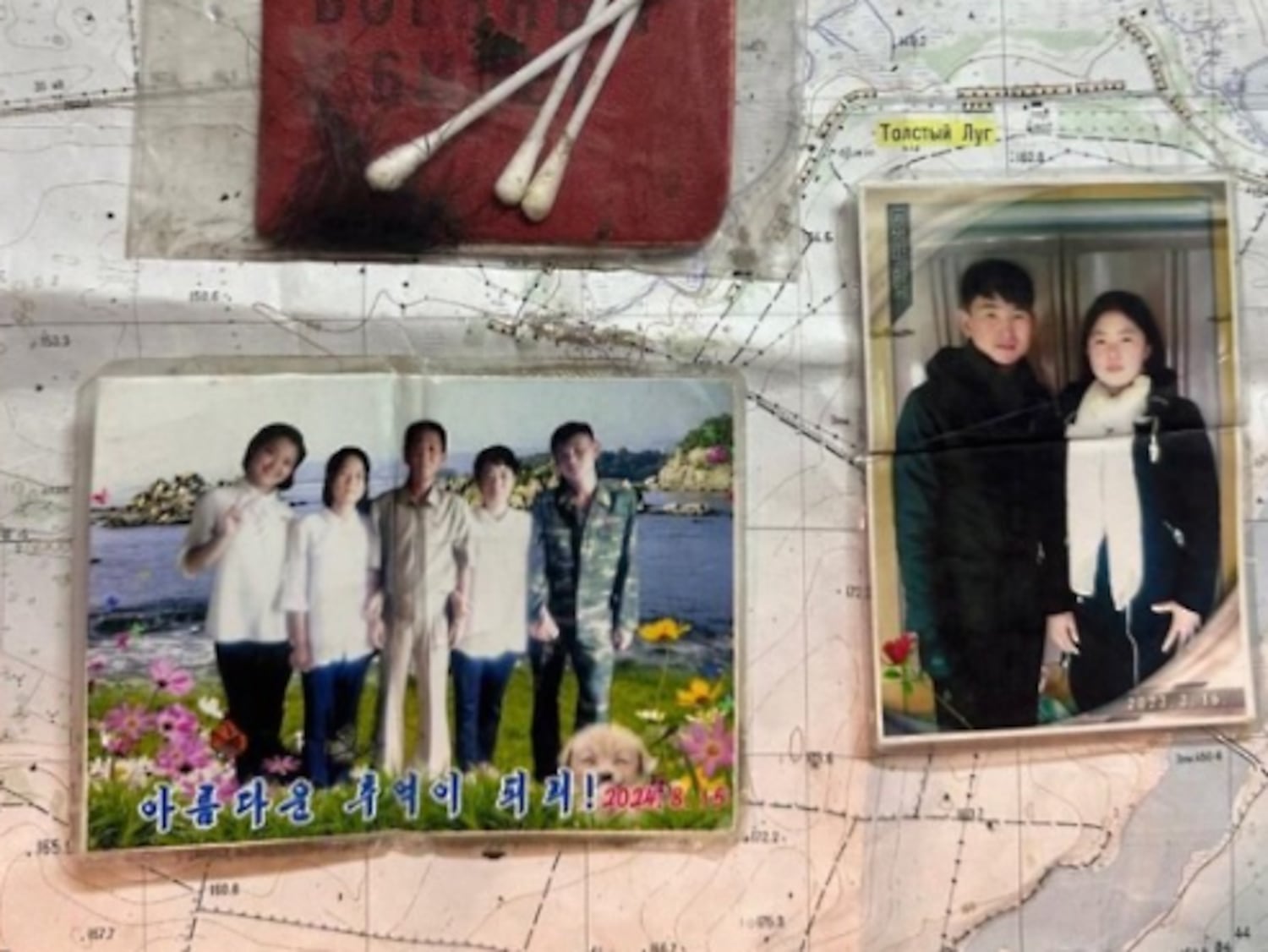
RFA’s own Korean Service also conducted an exclusive interview with a Ukrainian soldier sharing his battlefield encounter with North Korean soldiers.
Double Off Beat
As Washington, D.C. makes the final arrangements for U.S. President-elect Donald Trump’s inauguration next Monday, countries around the world are similarly preparing for the new U.S. administration. Senior reporter Kitty Wang from RFA’s Mandarin Service comes on the podcast to share insight into how China might react to the new administration.
What’s the overall mood in China regarding Trump’s possible implementation of tariffs? Will Beijing alter its stance on either Taiwan or the South China Sea while working with this new administration? What about the Uyghur region and Tibet? Tune in to hear these answers and more.
This content originally appeared on Radio Free Asia and was authored by Amy Lee for RFA Insider.
This post was originally published on Radio Free.
From Joan of Arc, the novel Mark Twain considered his finest work—one that took him longer to write than any of his other books, and one so deeply personal to him that he chose to publish it anonymously:
“When we consider that her century was perhaps the most brutal, depraved, and morally corrupt in history since the Dark Ages, we are left in awe at the extraordinary emergence of such a figure from such a time. The contrast between her and her era is as stark as the difference between day and night. She was truthful in a world where deception was the norm; she was honest when integrity had nearly vanished; she kept promises when few would even make them; her great intellect was devoted to noble causes, while others squandered their brilliance on trivialities or selfish pursuits; she embodied modesty, grace, and refinement when loudness and vulgarity had become commonplace; she harbored compassion when cruelty ruled; she stood firm in her convictions when stability was unknown; she was a beacon of honor in an age that had forgotten its meaning; she was steadfast when others were adrift in doubt; she maintained her dignity in a time of sycophants and servility; she exhibited courage when her nation’s hope had withered; she was pure in thought and action in an era where corruption ran rampant at the highest levels; she was all of these things in a world where crime was the everyday business of kings and nobles, and where even the most powerful figures in Christendom shocked the world with their treachery, bloodshed, and barbarism.”
In this week’s bonus show, Andrea mines the timeless lessons in Mark Twain’s portrayal of Joan of Arc, drawing connections between her legacy and contemporary struggles—both in the U.S. and in Ukraine, which faces its most daunting challenge under Russian-backed Trump. No matter how grim the situation may seem, history shows us that movements born from collective action can prevail.
Want to enjoy Gaslit Nation ad-free? Join our community of listeners for bonus shows, ad-free episodes, exclusive Q&A sessions, our group chat, invites to live events like our Monday political salons at 4pm ET over Zoom, and more! Sign up at Patreon.com/Gaslit!
Show Notes:
People’s March January 18: Find a location near you: https://map.wewontgoback.com/local
People’s March–more info: https://www.peoplesmarch.com/
Opening Clip: https://x.com/atrupar/status/1879698232495734828
Is American an Oligarchy? https://www.gaslitnationpod.com/episodes-transcripts-20/2024/12/10/is-america-an-oligarchy
Rep. Rick Crawford expected to serve as House Intelligence chair https://www.politico.com/live-updates/2025/01/16/congress/crawford-to-be-named-house-intel-chair-00198644
Luigi Mangione: Shooter or Superfan? https://www.youtube.com/watch?v=CwGVUvq7Pq4&t=18s
ICYMI: Here are previous documents the Security Committee has shared:
• Tech Travel Tips : https://web.tresorit.com/l/hmKP6#FFHiLuu45pSJtMo_Z9Zp9Q
• Why defending your right to privacy is important: https://web.tresorit.com/l/73FHq#ip5_zE6hhWkuaDMBAAhpYw
• Introduction to VPN https://web.tresorit.com/l/WHdqz#-zI5O7Q2zHznO_NG7aZWPQ
• Three Security Steps to Take Today: https://web.tresorit.com/l/417K9#CaDJOcOrEOta4T5oDlNsYw
• Practice Safe Data Security: https://web.tresorit.com/l/hiw9s#wOykkL6Lh_Hz_TbRsiCiEQ
Read all the details in the PDF here:
https://web.tresorit.com/l/W6ots#IydZ2pnTmE1MLPJLkLZ73A
For the Gaslit Nation Book Club – First Meeting at the Gaslit Nation Salon on February 24 at 4pm ET:
Man’s Search for Meaning by Viktor Frankl
https://bookshop.org/p/books/man-s-search-for-meaning-viktor-e-frankl/8996943?ean=9780807014271
The Stranger: Introduction by Keith Gore Albert Camus (Author) Matthew Ward (Translator)
This content originally appeared on Gaslit Nation and was authored by Andrea Chalupa.
This post was originally published on Radio Free.
This content originally appeared on ProPublica and was authored by ProPublica.
This post was originally published on Radio Free.
This content originally appeared on ProPublica and was authored by ProPublica.
This post was originally published on Radio Free.
This content originally appeared on Democracy Now! and was authored by Democracy Now!.
This post was originally published on Radio Free.
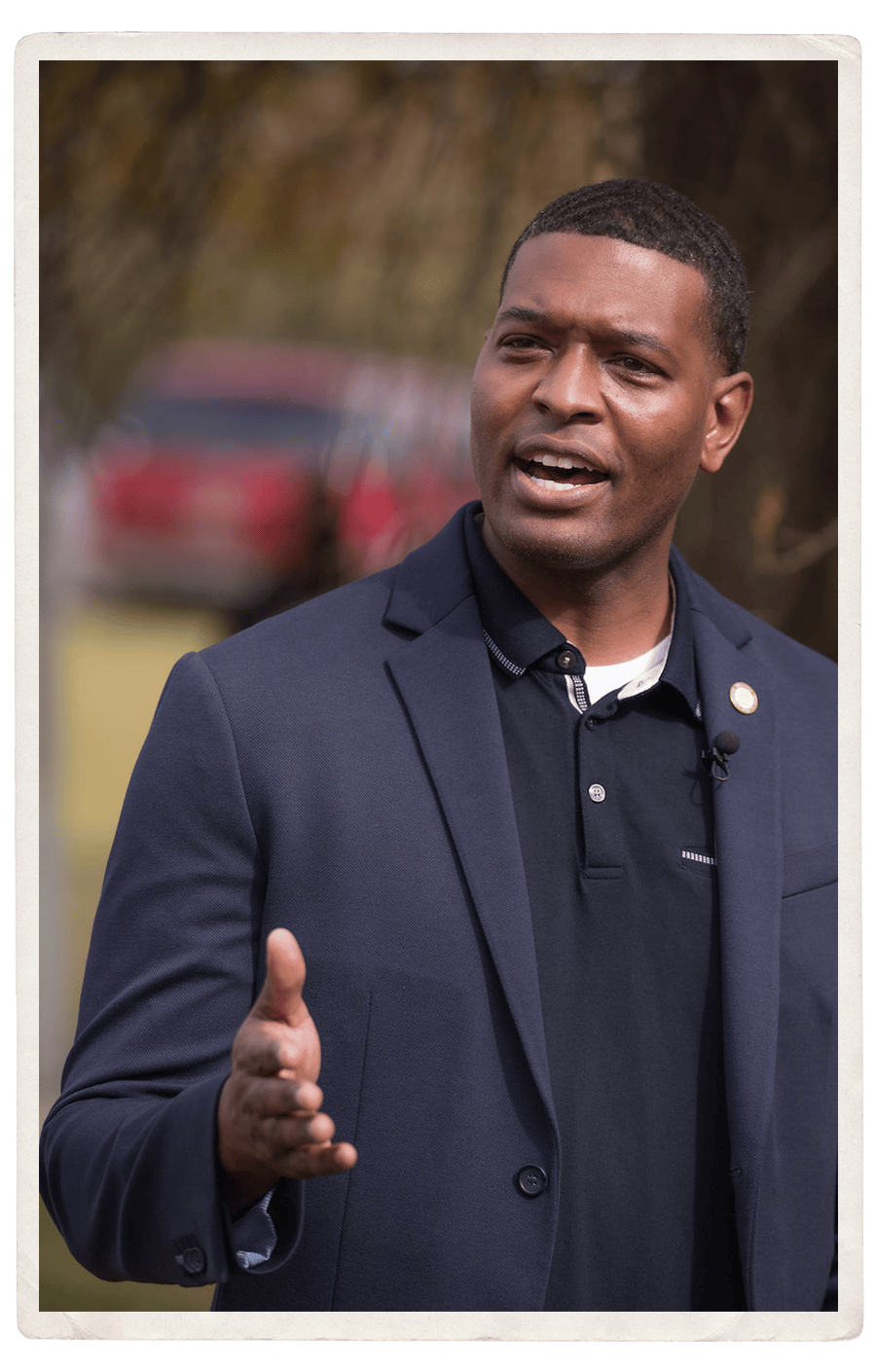
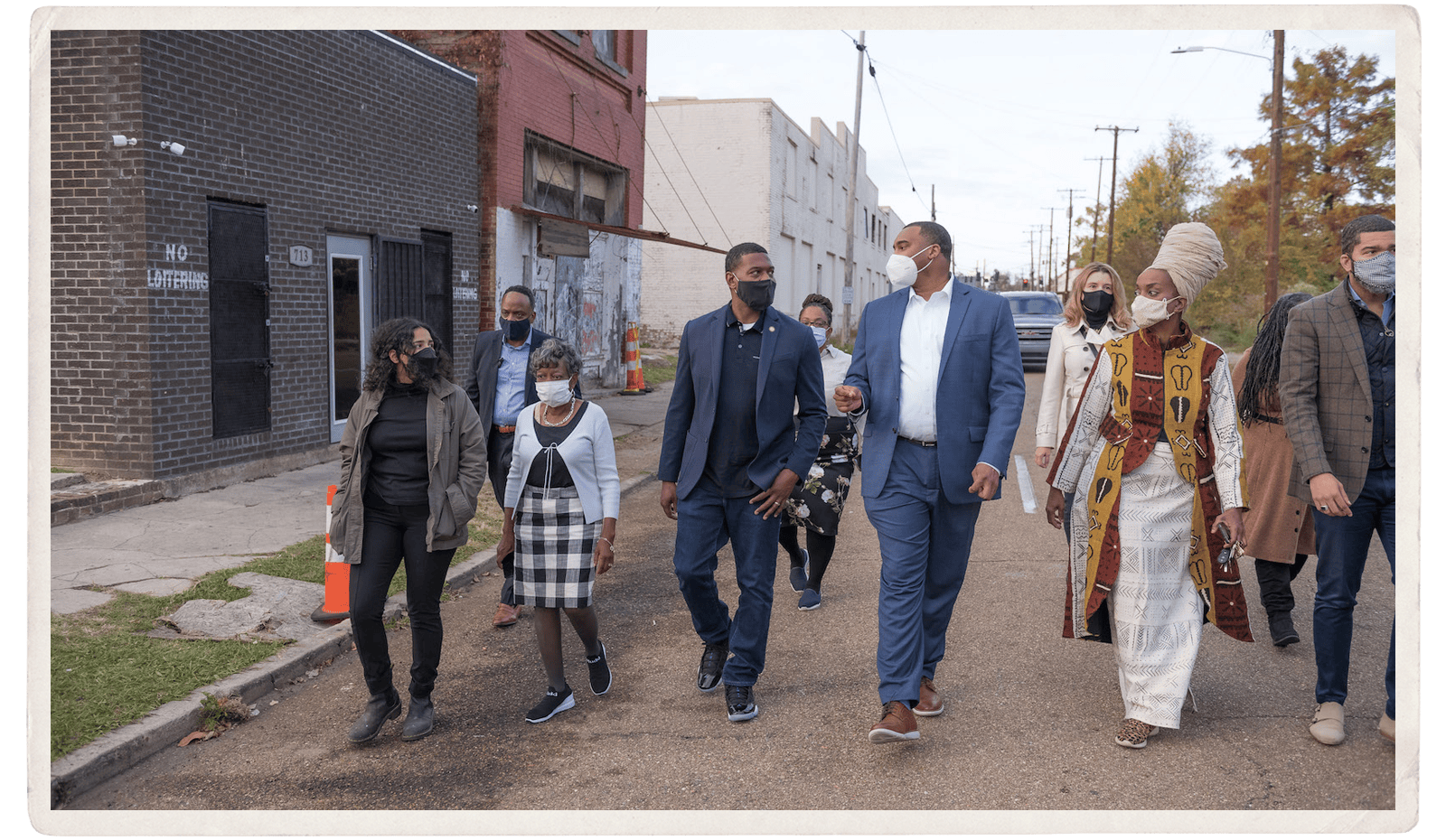
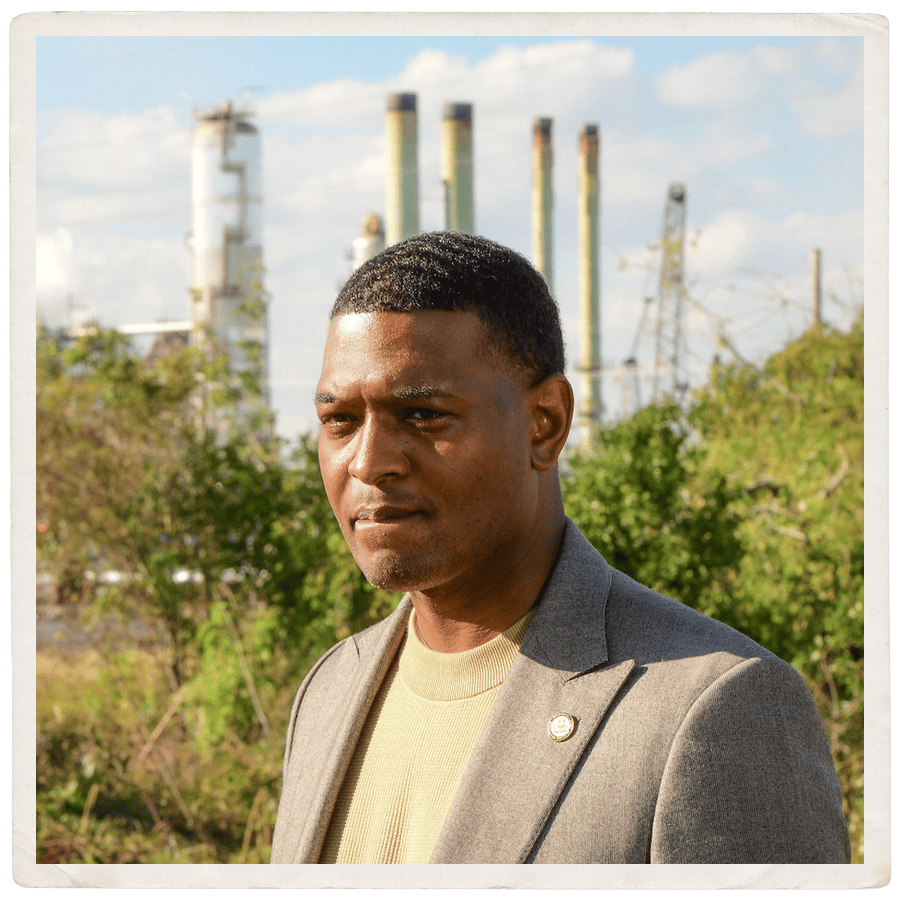
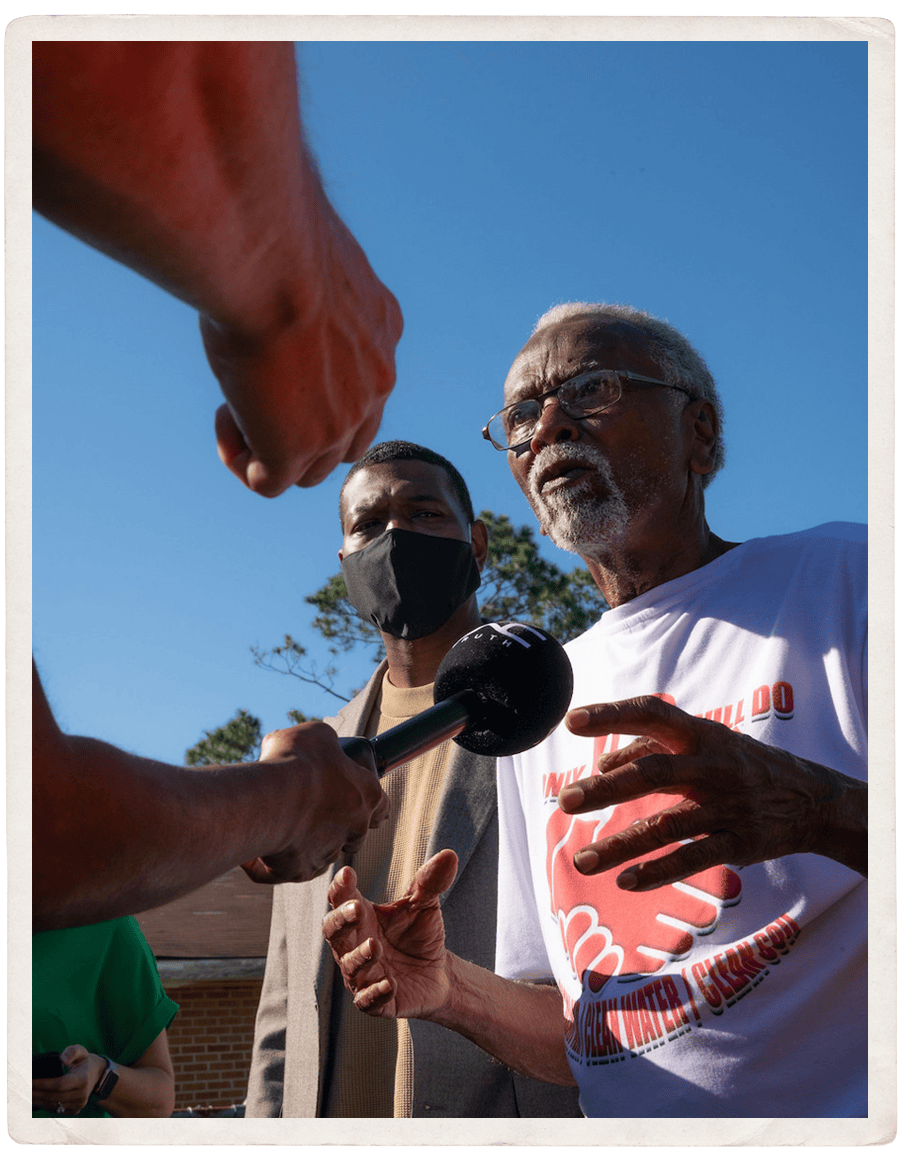
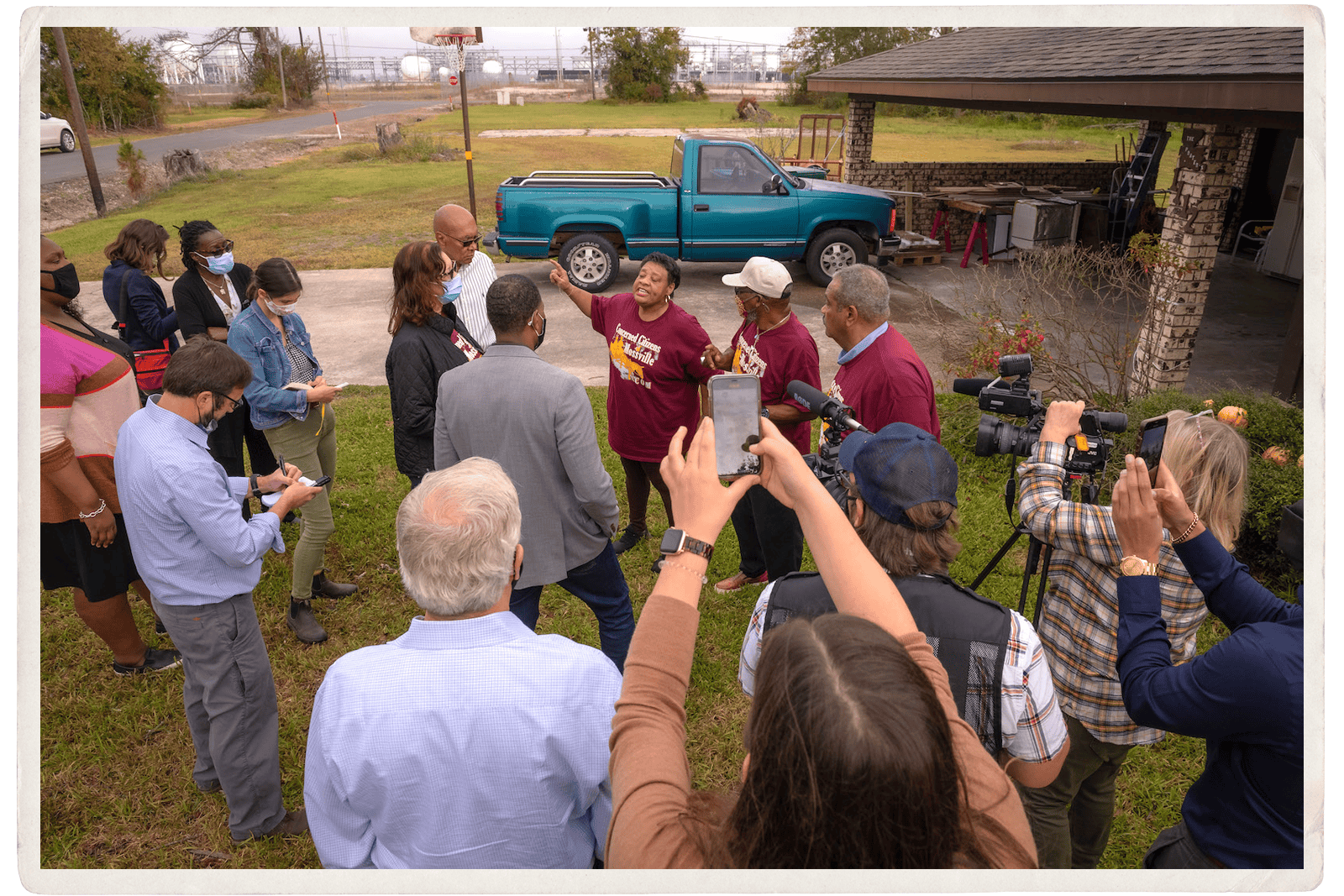
The Biden administration promised change for overpolluted communities in the South. Four years later, they’re still waiting.
By Lylla Younes Jan 16, 2025When President Joe Biden announced his Justice40 Initiative, a week after he took office in January 2021, it had been almost 30 years since a U.S. president had signed an executive order related to environmental justice. He directed the federal government to allocate 40 percent of the benefits of climate, clean energy, and other investments to disadvantaged communities “marginalized by underinvestment and overburdened by pollution.”
Biden’s initiative was a kind of rejoinder to President Bill Clinton’s earlier executive order, which directed federal agencies to identify and address the adverse human health and environmental effects of their actions on minority and low-income areas. While much toxic pollution was curbed in the decades in between, for the parts of the country with the highest concentrations of industrial activity, things hadn’t improved at all. More industrial companies set up shop. Dump sites swelled. Contaminated rivers became more contaminated. Lead accumulated in the soil. Biden’s Justice40 Initiative gave his new Environmental Protection Agency administrator, Michael Regan, the task of not looking away.
In November 2021, as if to signal that the EPA had turned a leaf, Regan embarked on a tour of Southern towns and cities where the problem of environmental injustice is most acute: Jackson, Mississippi; Cancer Alley and Mossville in Louisiana; Houston, Texas. Dubbed the “Journey to Justice,” he met with community leaders and residents whose testimonies he promised he’d take into account when he returned to Washington.
“[The tour] was really eye-opening,” Regan said in an EPA documentary about the trip. “To see it, to feel it, to have conversations. … I saw on the ground people expressing a desire to be treated like everyone else.”
This fall, I set out to retrace Regan’s tour and look for signs of whether and how much the struggle for environmental justice truly advanced under Biden and Regan. Having reported on the region and the EPA’s operations there for six years, I knew that in its most polluted areas, changing conditions on the ground would take longer than a presidential term; still, I wondered whether the immediate actions that residents say they need — fines for companies violating federal standards, home buyouts with fair prices, permit reform, more government transparency — had been granted.
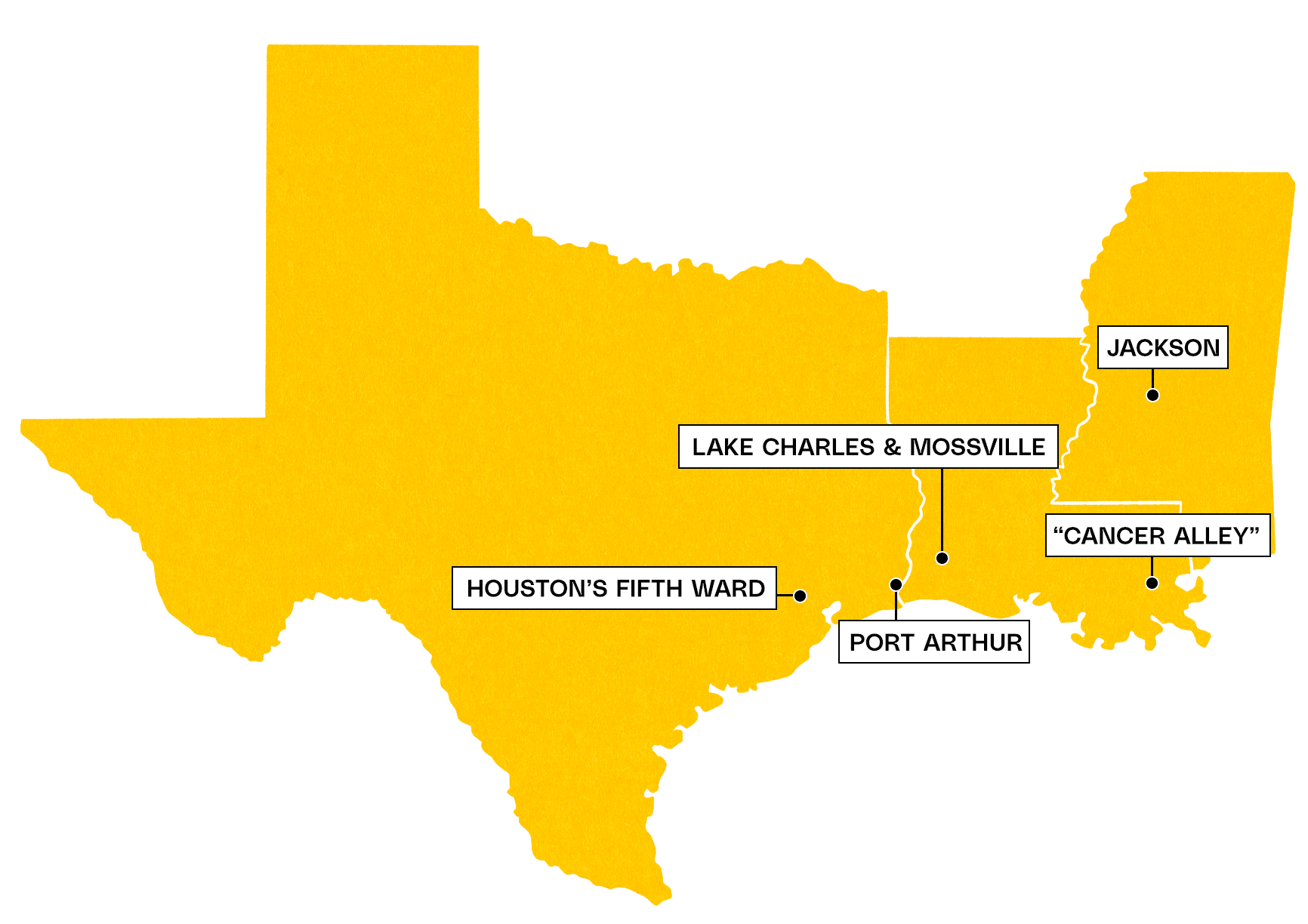
I knew that this iteration of the EPA was a test — of the limits of American bureaucracy, of the strength of industrial and corporate power, of the purpose and efficacy of the EPA itself.
No previous administration had dedicated enough resources, funds, or public relations efforts needed to confront industry’s unbridled expansion in the country’s most polluted and vulnerable areas. Cleaning up America’s air and water, a bipartisan mission at the EPA’s founding in 1970, has become highly politicized over the years, with reactionary state governments and industrial companies balking at the agency’s attempts to tighten regulations — all of which makes it difficult to imagine another administration, especially one led by Donald Trump, continuing these efforts.
Over 500 miles, through thick swampland and crowded interstate highways, I encountered scenes and people that elucidated the promise of Biden’s environmental justice agenda — and where it fell short. The administrator’s visits raised the profile of these industrial sacrifice zones and spurred EPA efforts to strengthen industrial regulations. But many community leaders remained frustrated at the agency’s hesitation to push for more aggressive, systemic change. Policies like permit reform and deepening community engagement could have helped safeguard the progress of the past four years against the whims of President-elect Donald Trump and his incoming administration, which has promised to clear the path for unchecked oil and gas production. Indeed, over the course of the Biden EPA, the agency’s core function was exposed. So were its limits.

Regan began his Journey to Justice tour in Jackson, Mississippi, on the same day in November 2021 that Biden signed the first of his two landmark climate bills, the bipartisan infrastructure act, into law. The capital city is at the end of a long period of decline. In most of its neighborhoods, tangles of overgrowth spill onto wide, empty streets bearing cracks and potholes. Torn up segments of asphalt and caution tape are ubiquitous. All across south and east Jackson, abandoned homes appear to be overtaken by the land, the roofs fallen in, the windows all gone, vines threading up the exteriors as if to pull the structures back down into the earth.
The city, which is more than 80 percent Black and has a poverty rate more than double the national average, is also in dire need of extensive infrastructure upgrades to its water system — an issue within the remit of the EPA. As Biden and Regan were just taking office, a quick succession of severe winter storms caused systemic failures at one of Jackson’s primary water treatment facilities. About 20,000 customers served by the O.B. Curtis plant — 15 percent of the city’s population — lost access to safe, reliable water.
The facility lacked proper weatherization equipment and suffered from a lack of corrosion controls, which allowed bacteria to spread throughout the system. By November, the city’s water distribution network was plagued by persistent leaks and lead contamination, and the whole system was nearing a breaking point. Rolling boil-water notices advised residents of E. coli contamination, which causes stomach pain and can lead to kidney damage. Additionally, two separate lawsuits filed by aggrieved parents blamed the city for their children’s lead poisoning diagnoses. One of Regan’s first stops in Jackson was to tour the Curtis plant with Jackson’s mayor, Chokwe Antar Lumumba, and Charles Williams, the city’s Public Works director. He pledged later that day to ensure the community, and others like it, would get the funds they needed to address infrastructure failures endangering public health.
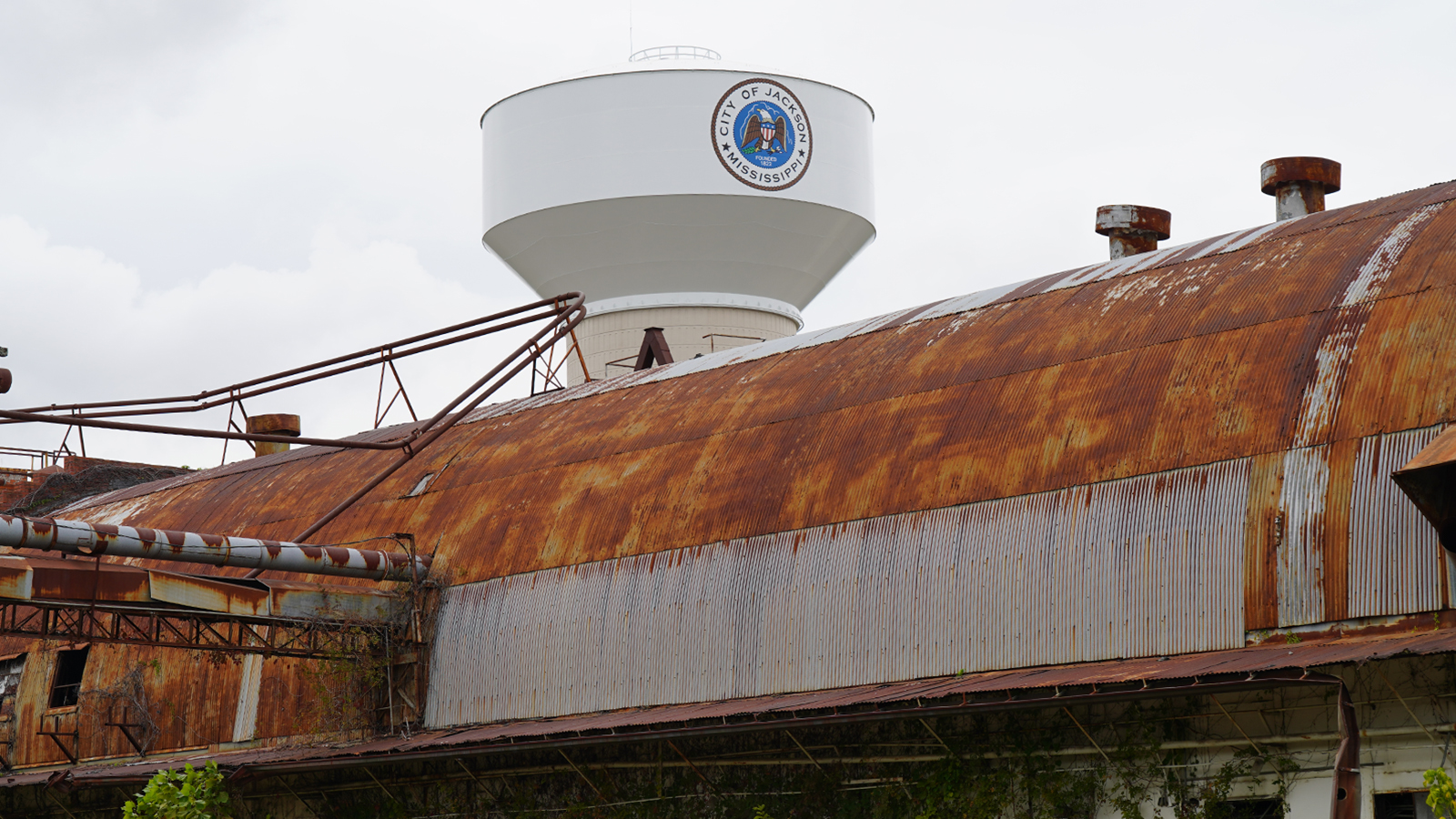
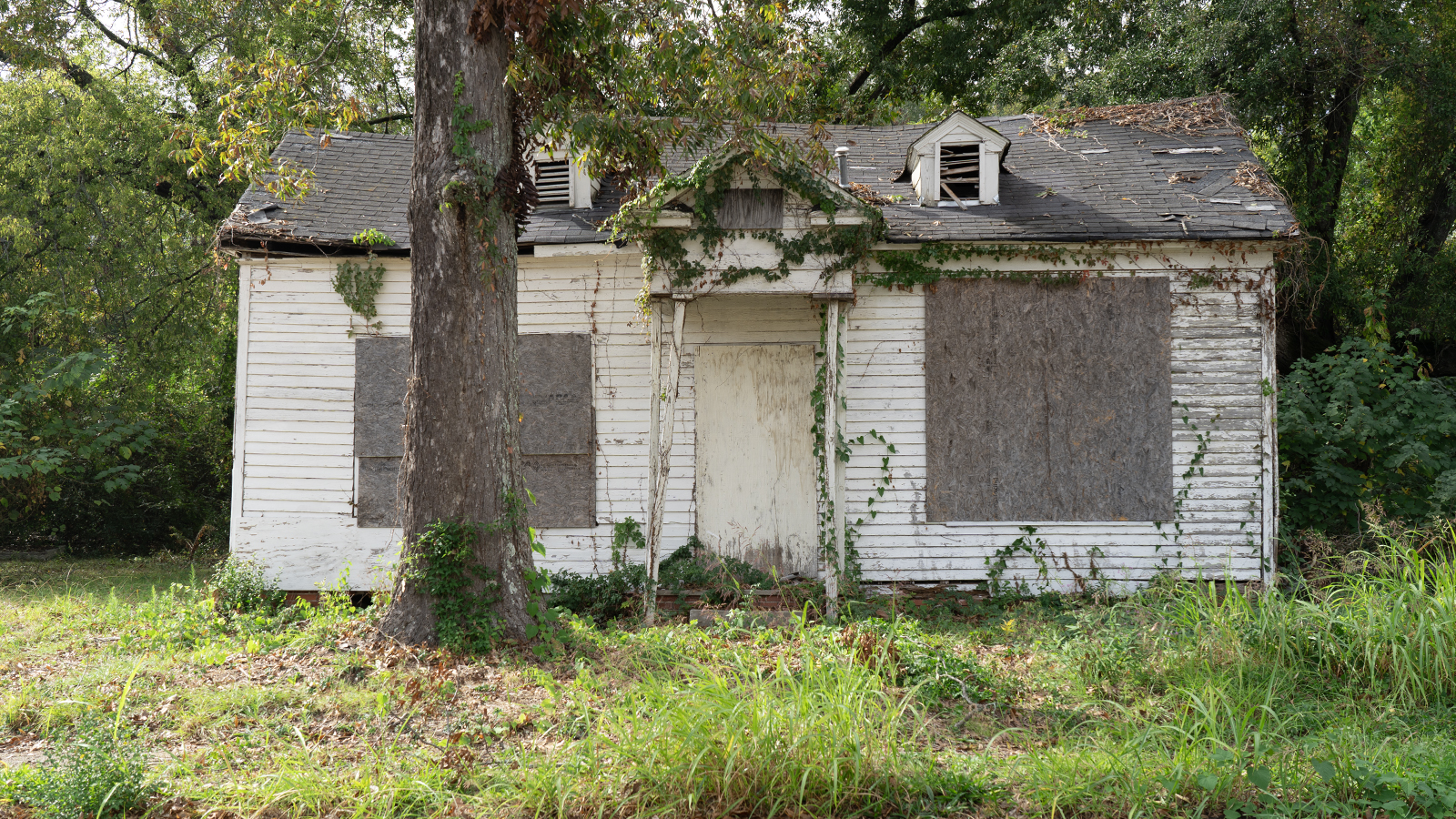
A water tower, left, looms over an abandoned soy depot in Jackson, Mississippi. In another part of town, right, vines overtake old buildings. Lylla Younes / Grist
Later in the day, after his visit to Wilkins Elementary School, which was enduring low water pressure, Regan championed Biden’s infrastructure spending as a solution to environmental injustice. “We want those who need these resources the most to receive them first,” he said. “So we’re going to work very diligently with our state partners to ensure that, in months not years, communities like Jackson will be able to receive the funds and move forward with investing the funds.”
In January 2022, just a few months after Regan’s visit, the EPA issued a notice of violation to the city for failing to comply with the terms of the Safe Drinking Water Act, requiring local officials to develop a corrective action plan. In August, heavy rainfall caused the pumps at O.B. Curtis to fail again. Water pressure throughout the network plunged, and the entire city was without potable water. Mississippi Governor Tate Reeves declared a state of emergency. Pictures of Jacksonians waiting in long queues for National Guardsmen to load crates of water bottles into their cars flashed across national headlines.
Regan visited Jackson twice in quick succession. “It’s hard to explain how and why [the] government has failed the city of Jackson and the people of Jackson,” he said in an October interview. When asked whether he would consider implementing “a state or a federal takeover of the Jackson water system,” Regan replied, “We’re evaluating all options.”
By November, the EPA’s complaint against Jackson for violating the Safe Drinking Water Act ended up in federal district court, where Judge Henry Wingate issued an order appointing Ted Henifin, an engineer known for his experience overhauling municipal water infrastructure, to manage the system. Several weeks later, the Biden administration allocated an unprecedented $600 million to fix the city’s beleaguered water infrastructure. Something like a takeover was beginning to take form, and it was a moment of great hope for a city that had suffered decades of white flight and discriminatory neglect.
But in the years since, Jackson’s water troubles have become not only a crisis of public health, but also one of public trust. A wide cast of characters continues to vie for control of both the system and the narrative, and ordinary people are left wondering about the true state of affairs. In 2023, Henifin created a private company named JXN Water to carry out the overhaul of the city’s water system, and through which all of the federal money is funneled. It was a move that only worsened the issues of trust. The EPA, for its part, has been sidelined in a process it created.
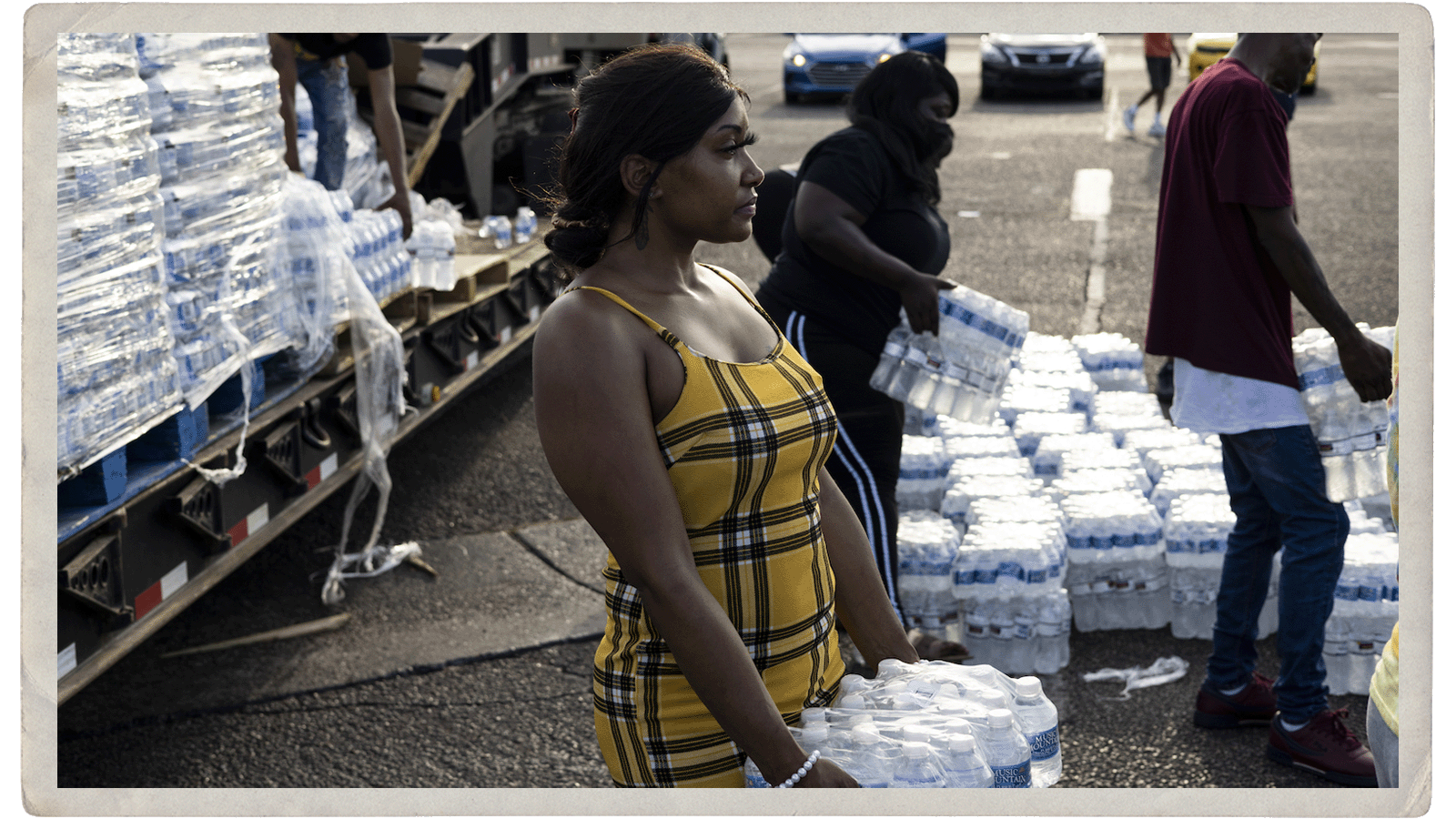
I arrived in Jackson on a rainy night last October, about a week before the presidential election. Momentarily forgetting the purpose of my visit, I opened the kitchen tap at my rental to fill a glass of water and was immediately hit with the stench of rotten eggs. I stood by the sink with the tap running for a moment longer, shocked by how quickly I had encountered the very problem residents had described to me on the phone over the past year. Then I noticed the tall water dispenser in the corner.
“You’re on a war boat declaring the mission’s been accomplished, but bombs are still dropping,” local activist Makani Themba told me the next morning, referring to President George W. Bush’s infamous speech about the war in Iraq.
That, she continued, was what it has felt like to have the federal government swoop in to address the failing water system, only for the problems to persist.
We were chatting at Themba’s kitchen table. She has warm eyes and curly snow-white hair, which she’d gathered in a high bun. That day, she and other local advocates were still reeling from a recent hearing in which Judge Wingate accused them of being racist against Henifin, a white man, for challenging his governance of the water system. All they’d been agitating for, Themba said while stirring a pot on the stove, is transparency and community engagement. She and other activists had initially been excited about the engineer, having heard from environmentalists in St. Louis that he had worked miracles there. But instead of a collaborative process, many Jackson residents and activists were shut out once Henifin established his private company to fix the city’s drinking water problem.
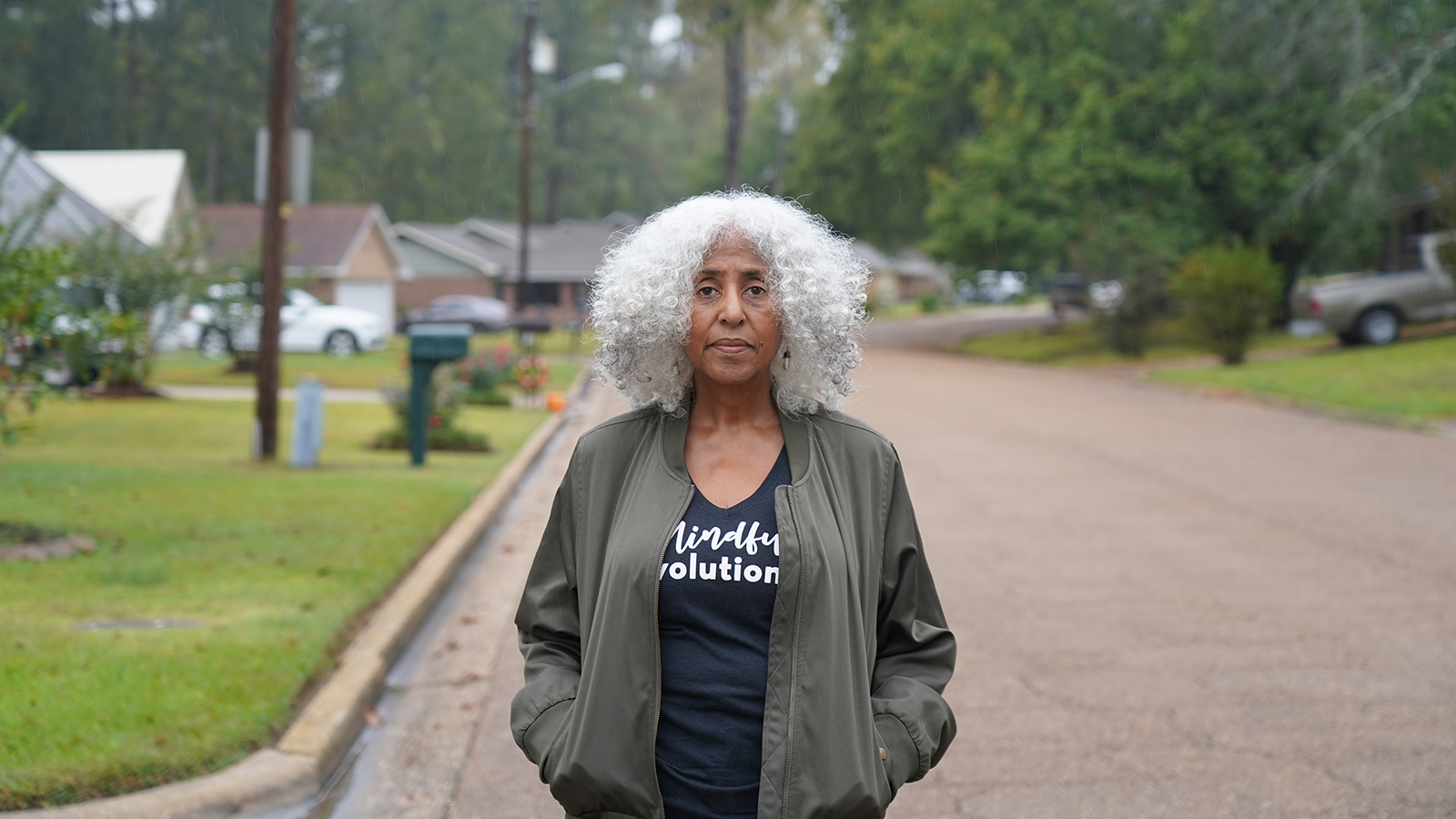
“I wish that the EPA’s behavior here in Jackson would reflect the goals and the principles that the Biden administration laid out,” Themba said. “They talk about community involvement and all these things, but that’s not what we’ve experienced.”
“I’d say right now we’re in the worst position we’ve possibly been in since the EPA stepped in to help us,” said Tariq Abdul-Tawwab, the director of the Mississippi Rapid Response Coalition’s ground support team, which has been instrumental in mobilizing bottled water, filters, and lead testing kits to Jackson residents. Reflecting on the hearing with Judge Wingate, he continued, “When you’re being told you don’t have the right to ask questions, it’s the beginning of the end.”
Outside the realm of advocacy and politics, the water crisis has become a part of daily life. Willie Williams, the owner of the local restaurant Sweet Spot, pays a monthly bill to upkeep a water filtration system he installed, because he can’t serve or cook with the tap water.
“It’s more than a crisis. I mean, it’s something that you have to add to your budget when you’re a business owner,” he said. “Water is very important.”
Another Jackson resident, Lula Henry, who I’d been connected with by a member of the Mississippi Rapid Response Coalition, had recently come home to find her washroom and carport flooded after a group of city contractors blew open a hydrant while working on her street. When I pulled up to her house, furniture and cooking equipment lay scattered throughout the front yard, drying off in the sun. Like other residents I spoke to, Henry only uses the tap water in her house for cooking and bathing, and relies on bottled water for drinking and brushing her teeth. She called JXN Water to understand what happened. No one came to help.

The drive from Jackson to south Louisiana takes about three hours, and shortly past the state line, the strips of pine forest flanking the highway give way to extensive swampland. After crossing the freshwater marsh at Lake Maurepas, I was finally in “Cancer Alley,” a stretch of land on the lower Mississippi River between Baton Rouge and New Orleans where over 200 industrial facilities operate in the vicinity of historic Black neighborhoods. Recent studies have confirmed what residents of the region have long said, that people living along the fence lines of these industrial operations suffer from higher-than-average rates of miscarriages, infertility, respiratory ailments, and cancer.
Under the system of air pollution regulation in the U.S., fighting the construction of new industrial facilities is difficult. Cleaning up existing ones is even harder. Amendments to the Clean Air Act passed by Congress in 1990 divided the country’s industrial landscape into different categories of facilities and gave the EPA a decade to develop a set of regulations for each. It was a momentous task that required agency staffers to collect emissions data for thousands of plants across the country and determine what technologies industrial companies should install to reduce the pollution. These new rules, while useful for reducing — though not eliminating — emissions from facilities without pollution controls, could only work at the margins of the health crisis taking shape in the country’s most industrial areas. As toxicologists often point out, in the case of potent cancer-causing chemicals like dioxins, no level of exposure is considered safe.
“There’s nothing in the Clean Air Act itself that says a community has a right to be healthy and safe,” said Monique Harden, a former director at the Deep South Center for Environmental Law and Policy. “It’s a voluminous and very technical document that puts into law the status quo of industrial operations.”
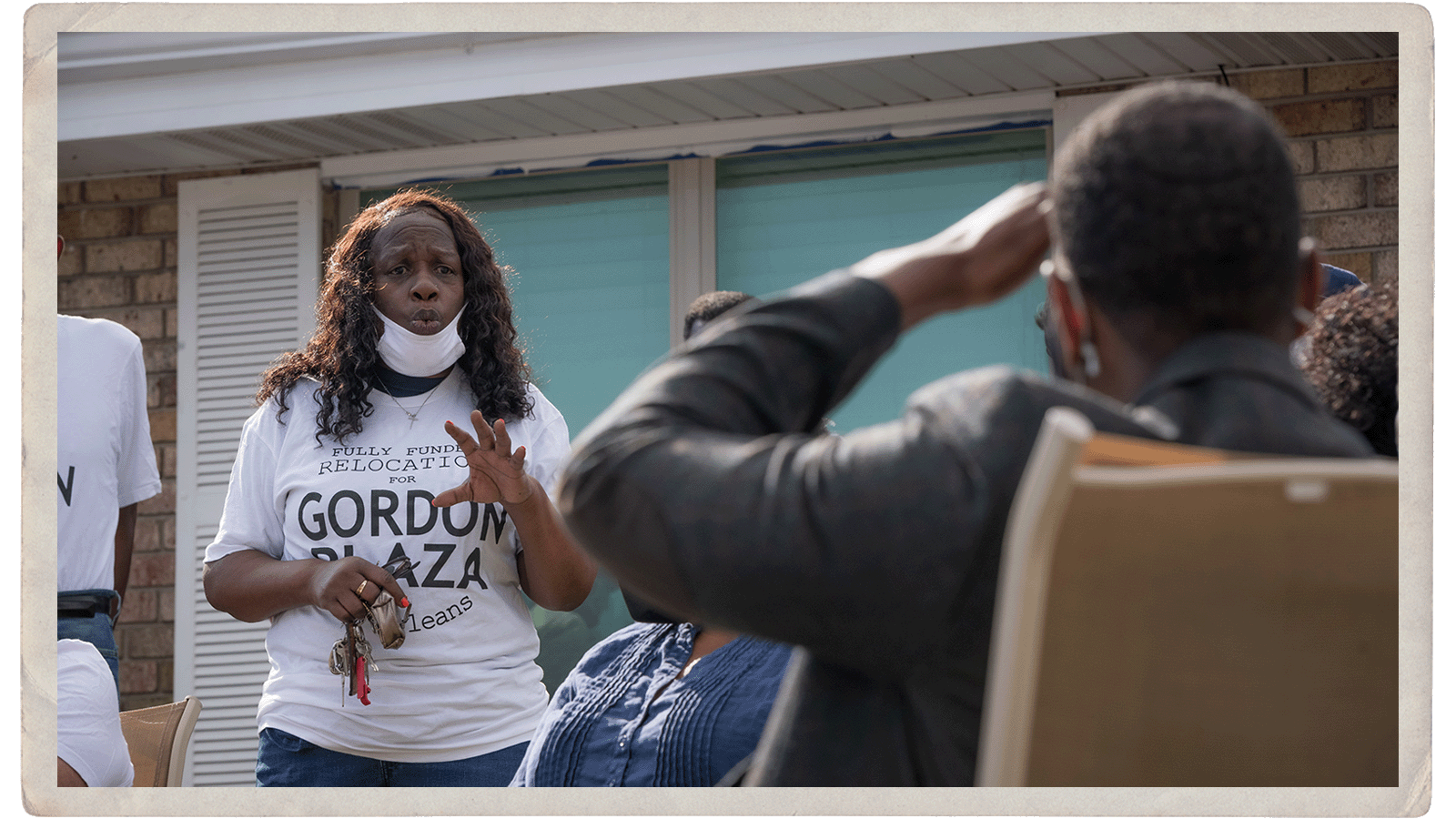
Scott Throwe, who spent 30 years working in the EPA’s enforcement division, remembers the 1990s as a time of great activity and immense pressure. Agency staffers were directed to write rules that wouldn’t generate much public comment controversy or lead to lawsuits from chemical companies. In their rush to finalize all the rules by statutory deadlines, certain community health protections fell through the cracks.
“It’s like watching a sausage get made. It’s not pretty, and we made a lot of sacrifices,” he recalled. “We couldn’t get perfect rules out, and sometimes they weren’t even very good. They were just OK.”
The amendments to the Clean Air Act also directed the EPA to revisit the slate of rules after eight years to assess the cancer risk that remained in communities. Many of these “risk assessments” were conducted under George W. Bush’s EPA, which adopted a far less protective standard of acceptable risk than prior administrations. Whereas the original text of the Clean Air Act said the EPA should strive to protect the public from pollution exposure with a cancer risk greater than 1 in 1 million, the Bush EPA began using the exponentially less protective standard of 1 in 10,000.
While the Bush standard may seem fairly protective on its face, agency assessments only evaluate the cancer risk from a single chemical at a time. In reality, though, multiple plants operate simultaneously and in close proximity, releasing a slew of toxic chemicals on surrounding communities. The true cancer risk is cumulative.
The task, then, of enforcing these standards lies with state governments. Regulators in state agencies have wide latitude to permit new industrial facilities, along with construction and operating permits, wherever they see fit, including in areas that are already highly polluted.
When Regan came to Cancer Alley in November 2021, he visited Fifth Ward Elementary in St. John the Baptist Parish. The school sits in the shadow of the Japanese chemical company Denka’s synthetic rubber manufacturing plant. Regan told residents that the proximity of the facility’s toxic chloroprene emissions to the school reminded him of his young son, and that the trip compelled him to use his “bully pulpit” to make change.
Later, Regan left for a tour of nearby St. James Parish. Among the group of activists, local residents, and reporters there to receive Regan and his staff was Sharon Lavigne, a local organizer. When he emerged from his travel bus, the sight of a sharply dressed Black man around the age of her son shocked Lavigne.
“I thought it would have been an all-white man with gray hair,” she said. “He was good-looking!”
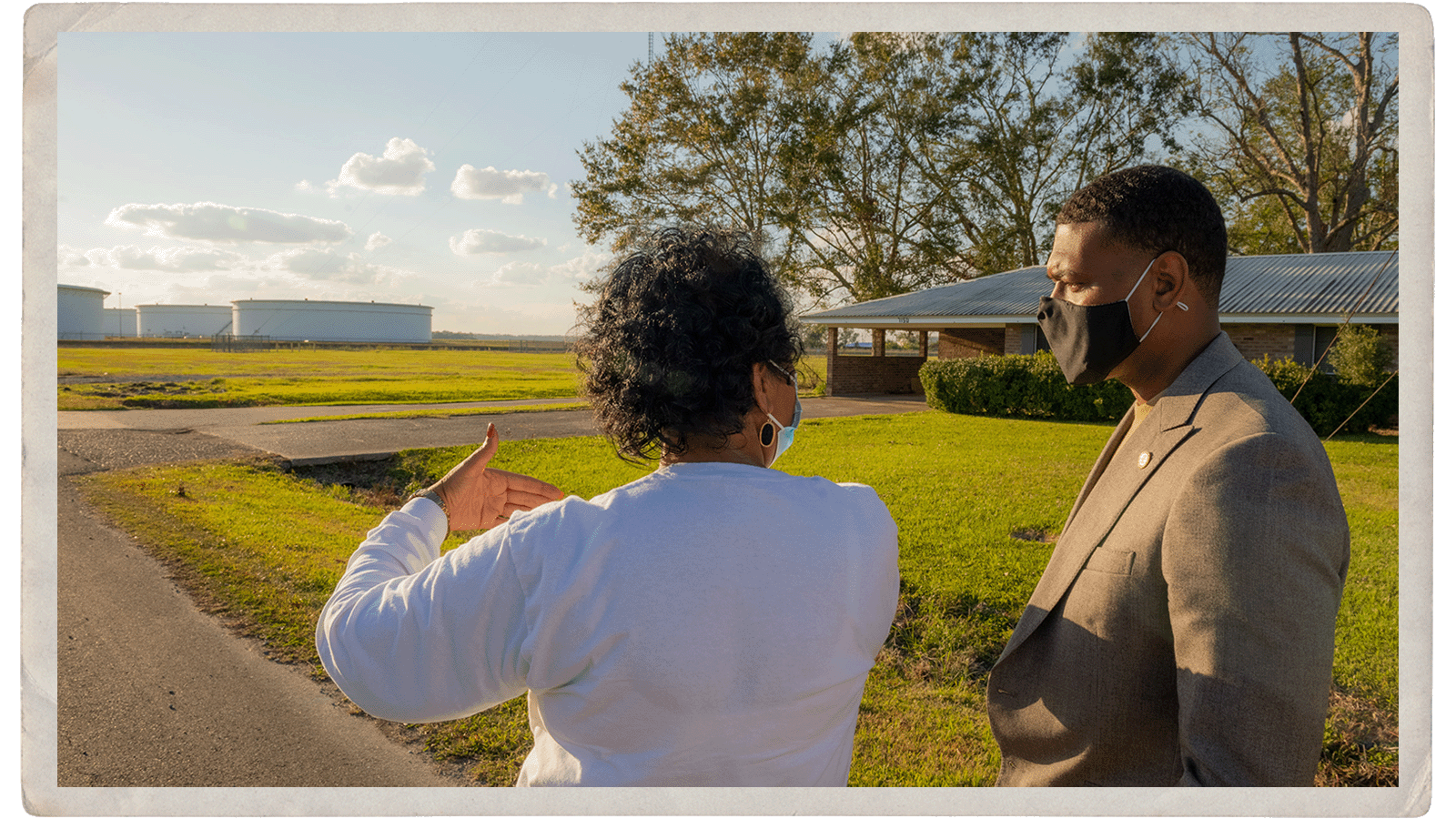
Regan expressed surprise at how close chemical storage tanks were to people’s homes. The administrator promised to buff up the EPA’s inspections of local facilities and require certain companies to install air monitors around their facilities.
In early 2022, Lavigne’s organization, Rise St. James, and several other local environmental groups filed two separate civil rights complaints with the EPA. One complaint alleged that the Louisiana Department of Environmental Quality, or LDEQ, had behaved discriminatorily by granting permits to companies to build in the parish’s Black neighborhoods, such as the Taiwanese chemical group Formosa’s proposal for a plastics complex in St. James Parish. The other contested the state’s decision to let Denka continue operating in St. John, despite the EPA’s own data showing that the cancer risk it generated violated federal standards. During previous presidential administrations, the EPA had allowed such complaints to languish unresolved, but under Regan’s leadership, the agency opened a civil rights probe into conditions in Cancer Alley.
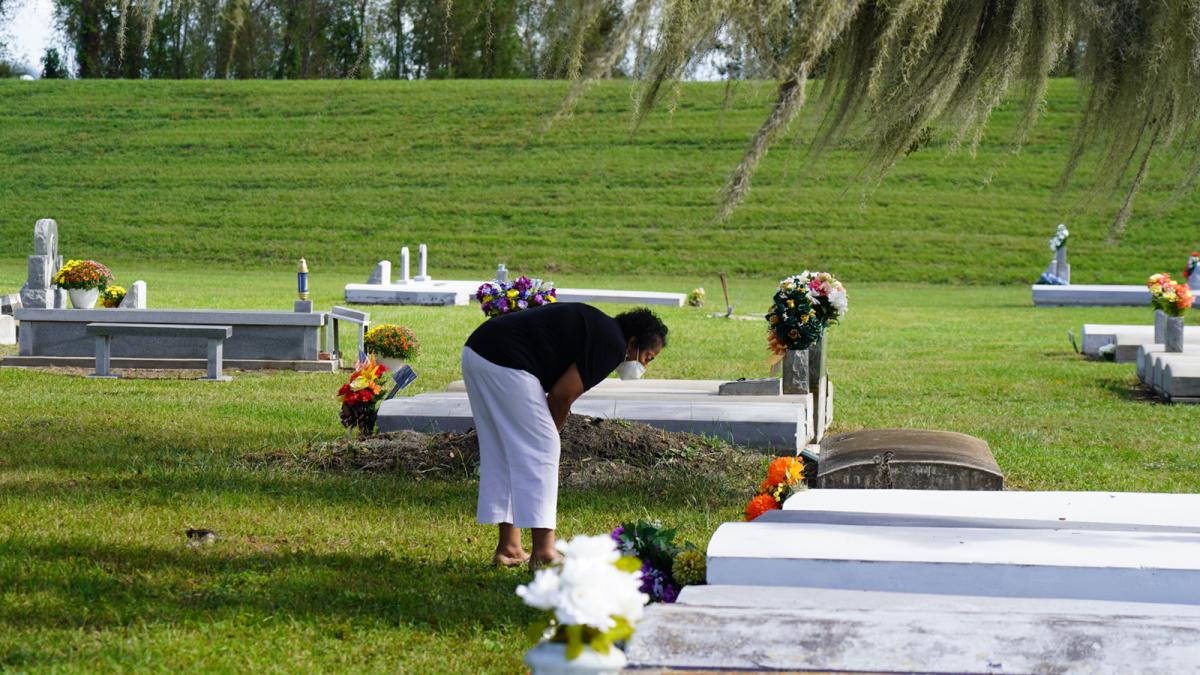
Federal and state officials were making significant progress at the negotiating table in the early part of 2023. Louisiana officials agreed to assess pollution levels in communities before greenlighting new industrial development. But then Attorney General Jeff Landry (who’s now governor of the state) sued the EPA and the Department of Justice, arguing that they were overextending their authority. A month later, the EPA closed its investigation.
To Lavigne, the EPA’s handling of the civil rights complaints constituted a genuine attempt at improving conditions in Cancer Alley. Others I spoke to weren’t so generous. Lifelong St. James resident Melvin Whittington said the EPA’s actions in the region amounted to little more than “a front to make you think they’re doing something, but they’re not.”
With the civil rights probe closed, the EPA has run up against the extent of its power to do anything about the alleged discrimination in Formosa’s permitting. As for Denka, an EPA lawsuit against the company has been slowly making its way through the court system while the facility continues emitting the highly carcinogenic chemical chloroprene. In June, the NAACP’s Legal Defense Fund sued the St. John the Baptist school board for violating its Civil Rights-era desegregation order by exposing the majority-Black student body to Denka’s toxic pollution — a tactic that exposes why the dynamics inherent to the hopeful phrase “environmental justice” are sometimes referred to with the more unforgiving phrase “environmental racism.”
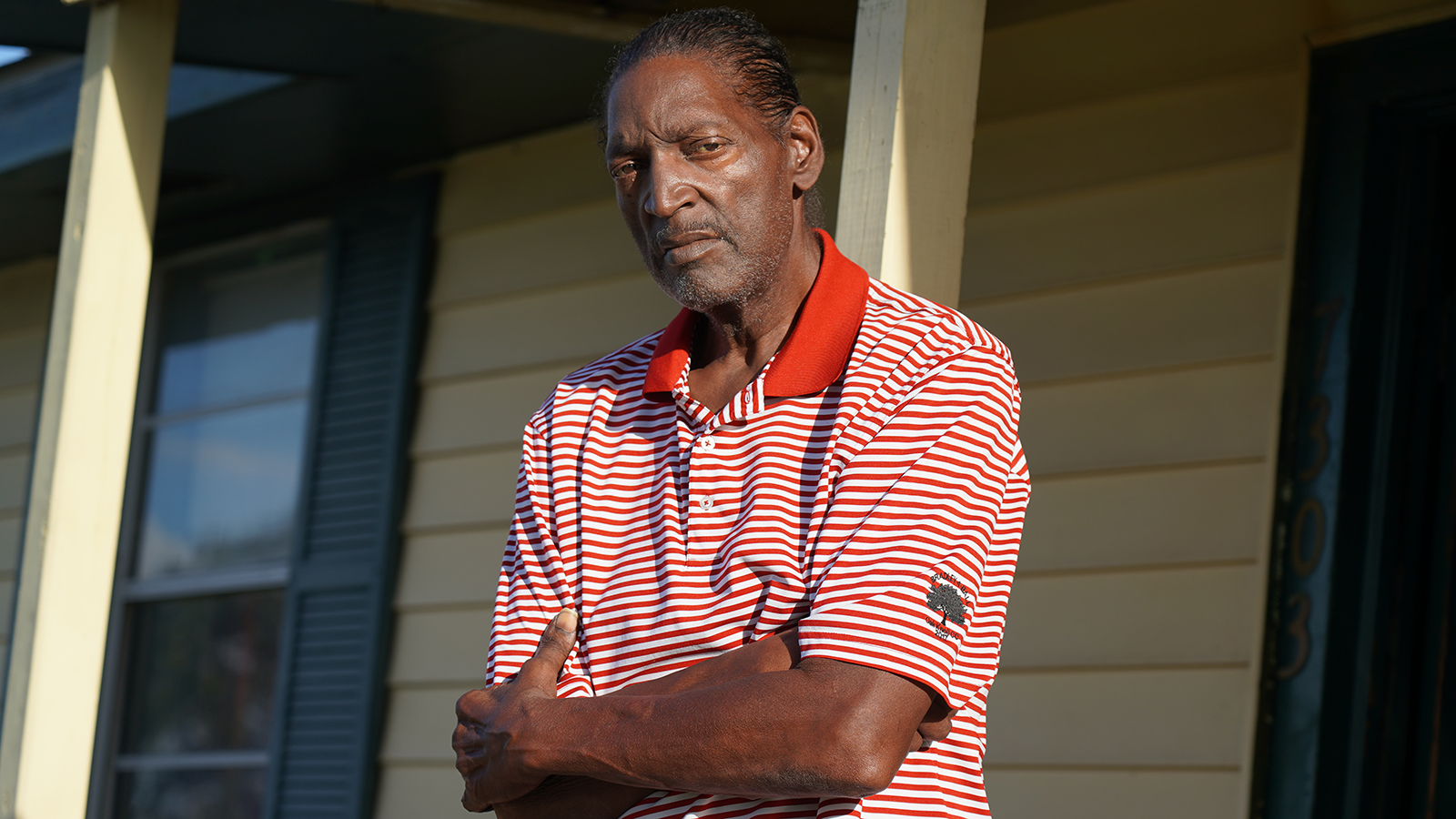

Melvin Whittington, left, said the EPA’s actions in Cancer Alley amounted to little more than “a front.” Whittington lives near the Denka synthetic rubber manufacturing plant, right. Lylla Younes / Grist
Considering these developments, Whittington wondered aloud whether the organizing they’d committed themselves to in Cancer Alley had even been effective. His words seemed to echo the sentiments of residents I’d spoken to in Jackson, who’d said that for all the resources and attention from the EPA, meaningful change was still elusive. “Doesn’t seem like we’re getting nothing done,” he said.
Five days after I left Cancer Alley, the St. John school board voted to shut down Fifth Ward Elementary.

On the morning of Election Day, I headed west toward Lake Charles, Louisiana, passing through sprawling fields of soybean and sugarcane under an overcast sky. The serpentine Calcasieu River forms the city’s northern border, and across it lie the industrial town of Westlake and the community of Mossville.
I’d been here before, back in 2021, when I sat on the plush couch of Debra Sullivan Ramirez’s dimly lit living room, just a month before Regan’s tour. Sullivan Ramirez grew up in Mossville and moved to the city of Lake Charles in the late 1980s to get her three children away from the pollution, which she attributed to the lesions that had formed on their skin. As I sat with Sullivan Ramirez and two of her friends, discussing the string of diseases that had stalked her family, she handed me a stack of documents she’d saved over the years — newspaper clippings detailing fires and explosions at local plants, permit files, emissions registers — evidence of a place under siege.
Over the past several decades, the greater Lake Charles-Mossville area has transformed into a transnational oil and gas hub, with new pipelines, liquified natural gas terminals, and industrial plants rising up out of the swamp and filling the air with the din of construction and the sweet odor of synthetic chemicals. In 2001, the South African chemical company Sasol, whose plant outside of Johannesburg is the biggest single emitter of carbon dioxide in the world, began building an ethane cracker in Mossville to produce ethylene. Sasol didn’t begin the industrial takeover of the town — that had started as far back as the 1940s — but it exacerbated the problems.
After deciding to expand its complex to include an ethylene cracker and a gas-to-liquid plant, Sasol began making offers to buy the properties of Mossville residents, but a study has shown that the company offered significantly less money to Black homeowners, many of whom trace their ancestry back to the founding of Mossville by formerly enslaved people. Some residents decided to take the buyouts anyway, and some decided to stay.
There are four things that the people of Mossville still want, Sullivan Ramirez told me: a lifetime of health insurance, free education, enough money to buy a proper home, and a memorial to honor everyone who’d died with cancer and liver failure.
Once called “the world’s most important chemical,” ethylene is used to manufacture everything from food packaging and airplane engines to polyester and drainage pipes. Toxic as it may be to create, it is an essential ingredient to modern life. But as Mossville learned, some people have to pay a higher price for it. A 2000 study from the Agency for Toxic Substances and Disease Registry found that the level of dioxins in Mossville residents’ blood was triple the national average.
When Regan’s tour bus pulled into Mossville that November, members of the Concerned Citizens of Mossville, a local advocacy group, showed him around. As they drove, one person asked Regan whether he was wearing a face mask to protect himself from COVID or from the air pollution. “Both, in this case,” he replied.
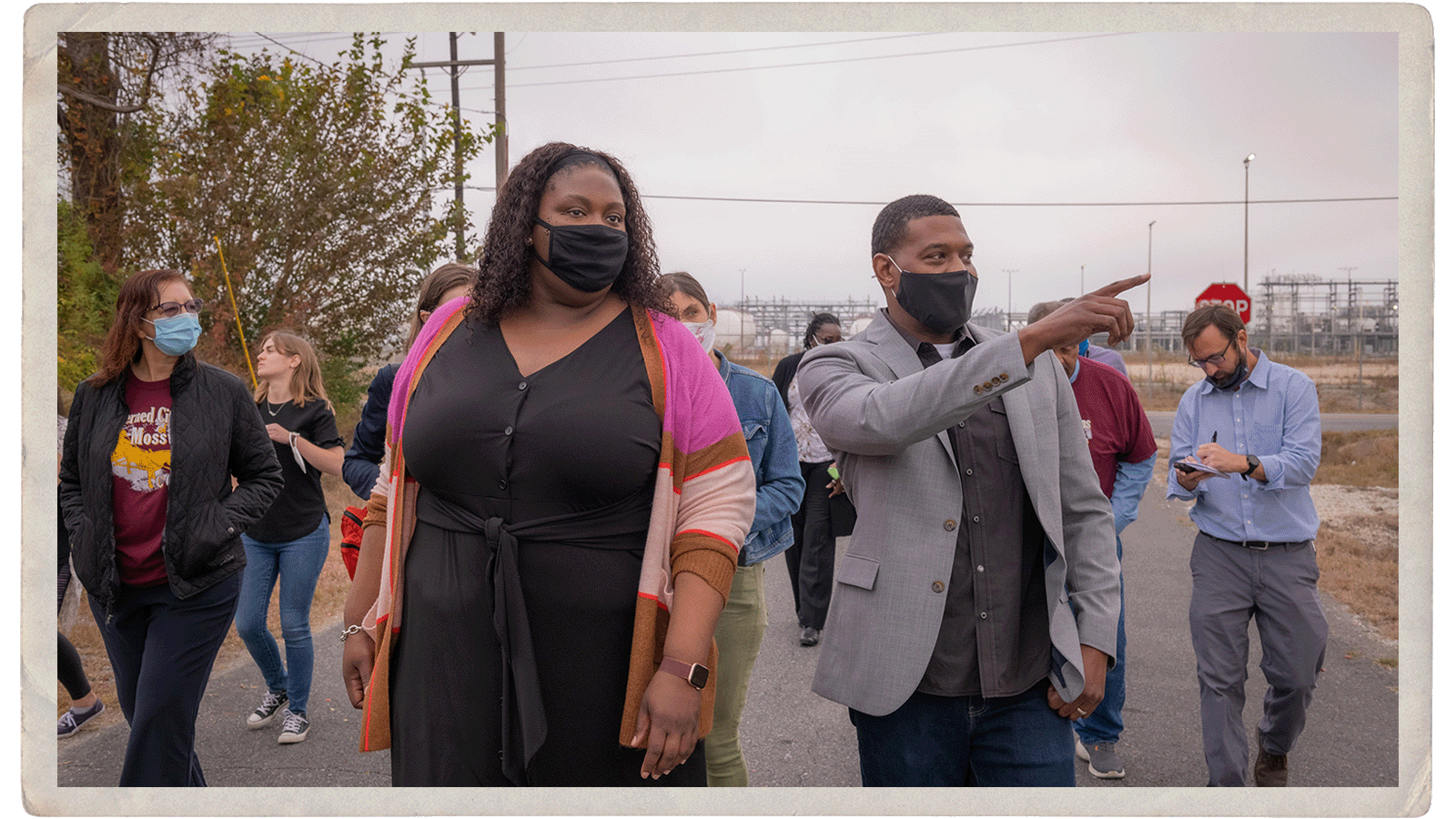
“It’s astonishing to see the level — the presence — of industry surrounding this community,” Regan told reporters later that day.
When I returned to Sullivan Ramirez’s house this fall, she was dismayed by the EPA’s actions since Regan’s visit. In January 2022, Regan announced funding for increased air and water monitoring in Mossville, but little else. Companies were rarely fined, or paid minimal amounts, for breaching federal emissions standards, and most importantly, people felt as though there was no way out. (Sasol, which earned $275 billion in 2024, reached a $1.4 million settlement with EPA last April for a string of violations, including a chemical fire at the facility). “EPA is just trying to pacify us. They’ve done nothing but ignore the community folk and what they want,” Sullivan Ramirez said. “We want true change.”
Today, the roads leading into Mossville are lined with abandoned homes with faded for-sale signs. As I approached, the air became acrid and I felt a familiar pressure in my nose, a sign of my proximity to petrochemical pollution. In the parking lot of the old community rec center, a man on a four-wheeler approached and asked what I was doing there. When I said I was a reporter, he waved me off and began driving away.
“Are you from Mossville?” I quickly asked.
He said he didn’t want to talk, that people like me came through from time to time and took pictures of the plants looming over people’s homes — and then they left.
But, he said, he’d been living there all his life. His mother’s home was down the road. The rec center was still open, he said, and if I stayed long enough I might see some kids playing ball. Sure, many folks had left. But for some, he made clear, Mossville was still home.
Mossville seemed to represent more clearly than anywhere I’d visited the terminus of unchecked industrial growth, the final result of a regulatory system administered by industry-friendly state governments and overseen by a federal agency with little power to do anything to upset business as usual. A well meaning EPA, like Biden and Regan’s, could offer an ear to communities in the crossfire or require companies to use better technology and hang up air monitors. But in a place like Mossville, the root of the injustice — a massive chemical complex — is left unchecked.
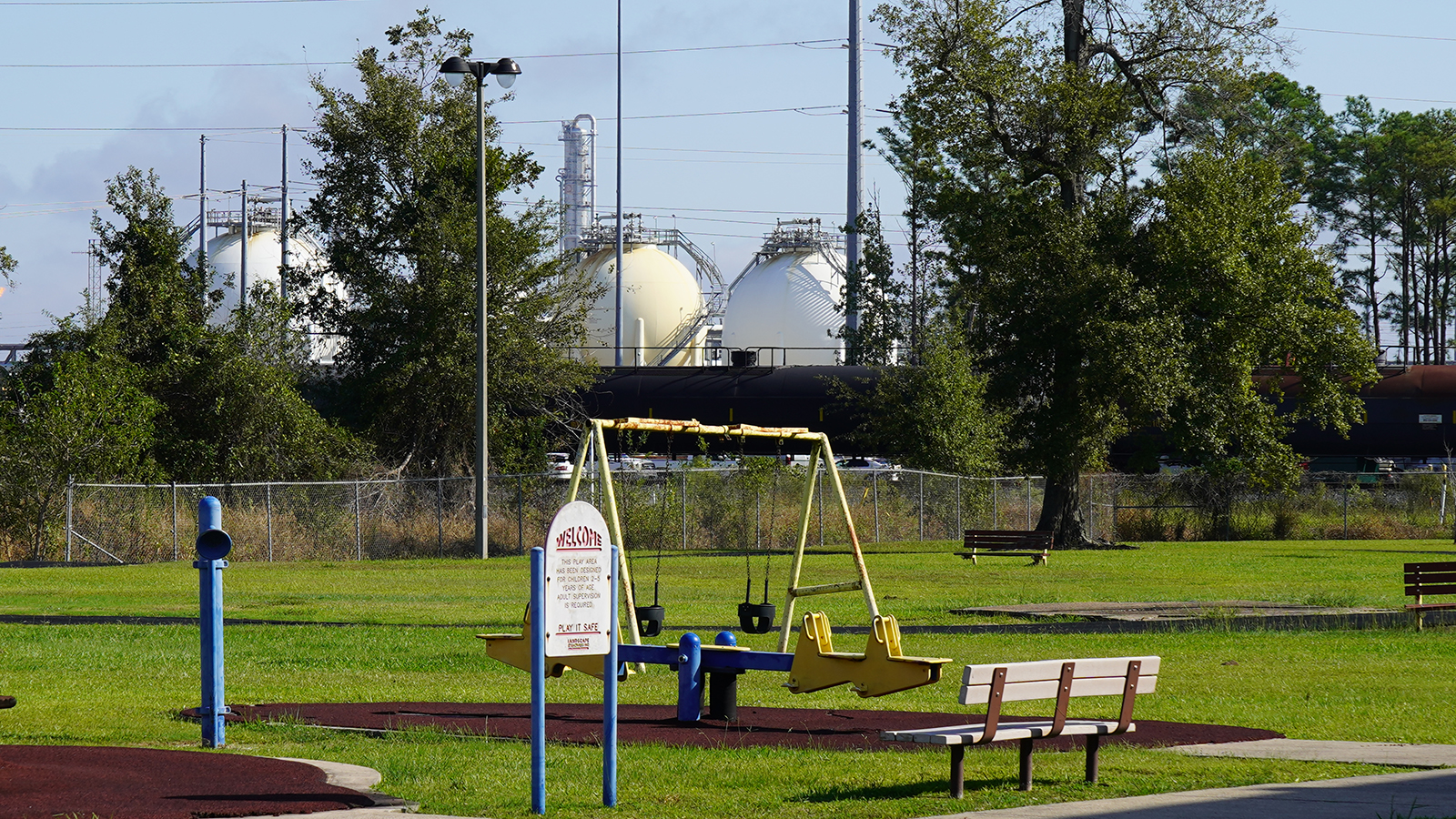
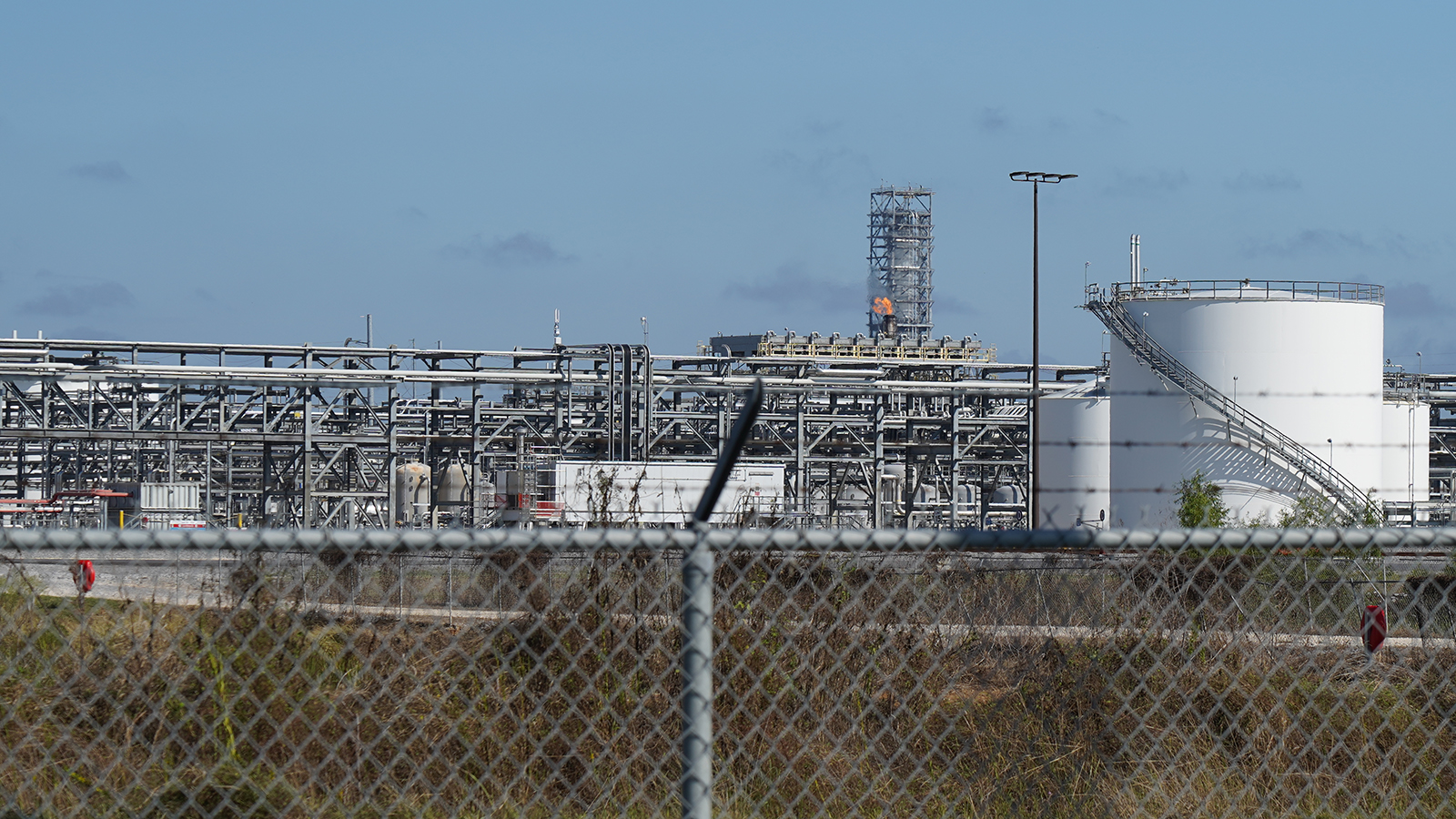
A playground sits in the shadow of a petrochemical facility in Mossville, Louisiana. More clearly than anywhere I’d visited, Mossville seemed to represent the terminus of unchecked industrial growth. Lylla Younes / Grist
Heading west from Mossville, the problem of pollution hotspots remains starkly apparent on the Texas Gulf Coast, where 10-lane highways fill the air with smog and dozens of industrial companies operate close together and share pipelines, storage infrastructure, and export docks. Regan traveled these highways on his way to Houston’s Fifth Ward, the last stop on the Journey to Justice.
The neighborhood is framed by plants that make concrete along Interstate 45 to the west and metal recyclers dotting Interstate 69 to the east. A cancer cluster, defined as a greater-than-expected number of cancer cases in a particular area, was identified in the community, the result of soil poisoning from Union Pacific Railroad’s former operations. A 2020 Houston Health Department study of the Fifth Ward found that more than 40 percent of the households surveyed had at least one cancer case.
Regan visited two churches and an elementary school in the Fifth Ward. He sat in the front yard of local activist Sandra Edwards’ home, and listened as she detailed the experience of living on contaminated earth. She wanted more than just a reduction in pollution levels. Like Sullivan Ramirez in Lake Charles, Edwards demanded restitution for the harm already done to residents’ health.
“We shouldn’t have to go all the way to the medical center across town,” she told him. “We should bring a facility to this neighborhood for people.”
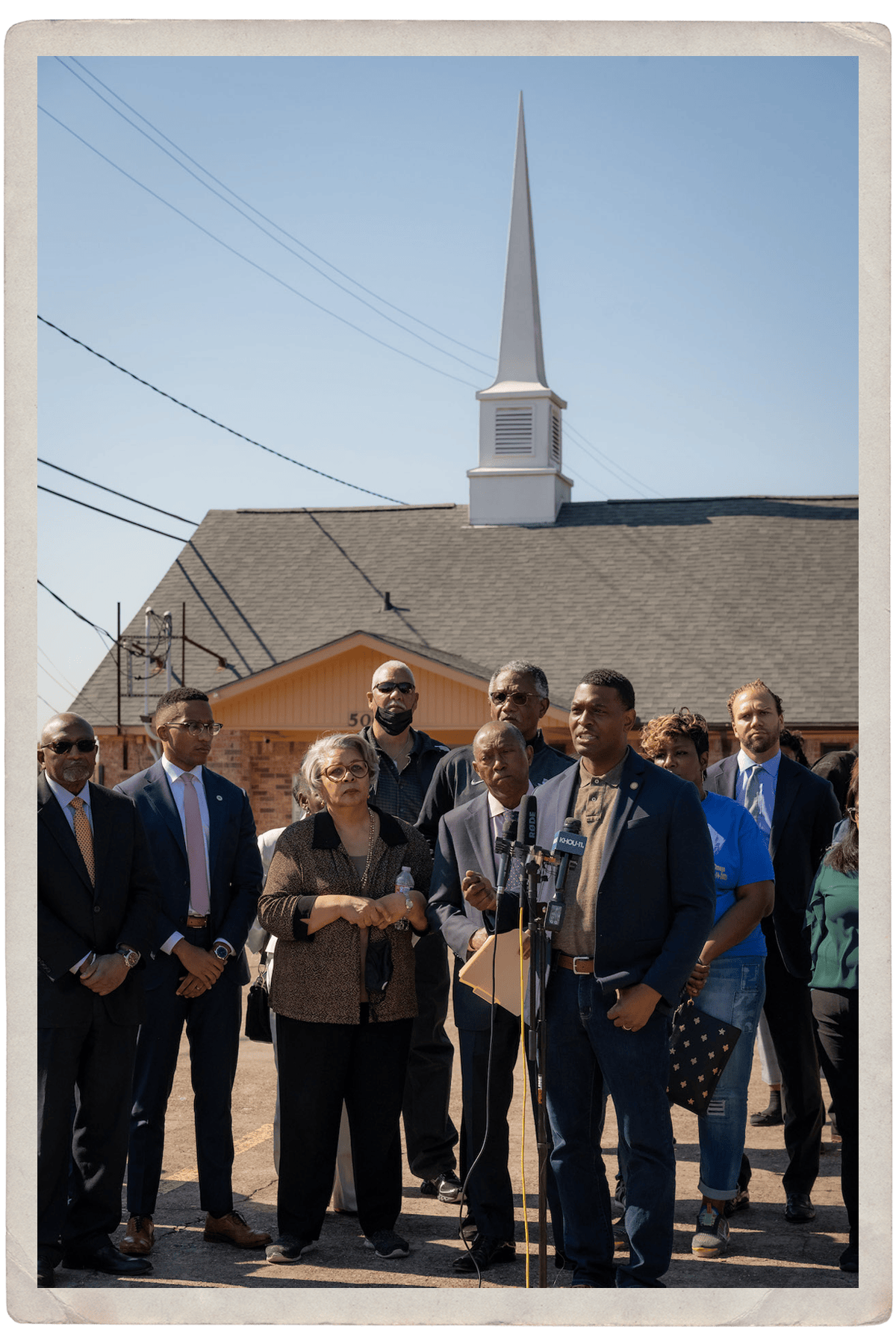
Regan promised Fifth Ward residents what he had other communities on the tour — air monitoring, stronger enforcement, and better oversight of the state regulator.
“EPA is exploring ways that we can legally read the Clean Air Act in a way that allows us to take into consideration some of these external factors,” he said. “Do we believe that there’s some vulnerabilities there if people want to challenge us in court? Possibly. But the only way to find out is to test it.”
Longtime Houston resident Leticia Gutierrez left her corporate job for a position at Air Alliance Houston, an environmental justice advocacy organization, after her son was diagnosed with childhood asthma. Administrator Regan’s visit was meaningful, she said, particularly for the residents he met with, who have long family histories of cancer.
At the start of Regan’s term, Air Alliance Houston had really believed that change would come, but, Gutierrez said, “Here we are, four years later, with not much to really speak of.” The industrial facilities surrounding Houston kept up their steady work: In 2023, the city’s smog levels violated health-based standards on 55 days, more than any other year since 2011.
“We have access to EPA now,” she continued, “but what has that actually translated to?”
One thing that the EPA did do, in November, was to release its Interim Framework for Advancing Consideration of Cumulative Impacts, which the agency opened for community feedback. Once the document is finalized, it will provide guidance for local governments to better understand and mitigate the effects of cumulative pollution. That framework, however, will amount to little more than words of advice to state agencies unless a successive EPA administrator moves it forward.

On the last day of my trip, I drove back east to a city that Regan skipped over — Port Arthur, Texas, which is 75 percent non-white and is one of the country’s most important fossil fuel export hubs, where thousands of cubic feet of fracked gas are loaded onto tankers and shipped to Europe each year.
I was on my way to meet with John Beard, an environmental advocate and former chemical industry worker who’s now known for giving his own kind of tours. We were joined by a group of European climate activists traveling between hotspots of greenhouse gas emissions in the U.S.
We piled into Beard’s car and drove through the old downtown toward the industrial infrastructure along the coast. Abandoned buildings lined the streets around the city hall. In the surrounding neighborhoods, many homes had boards or plastic sheets instead of windows — damage from past hurricane seasons. Beard began listing facts about the city’s petrochemical history.
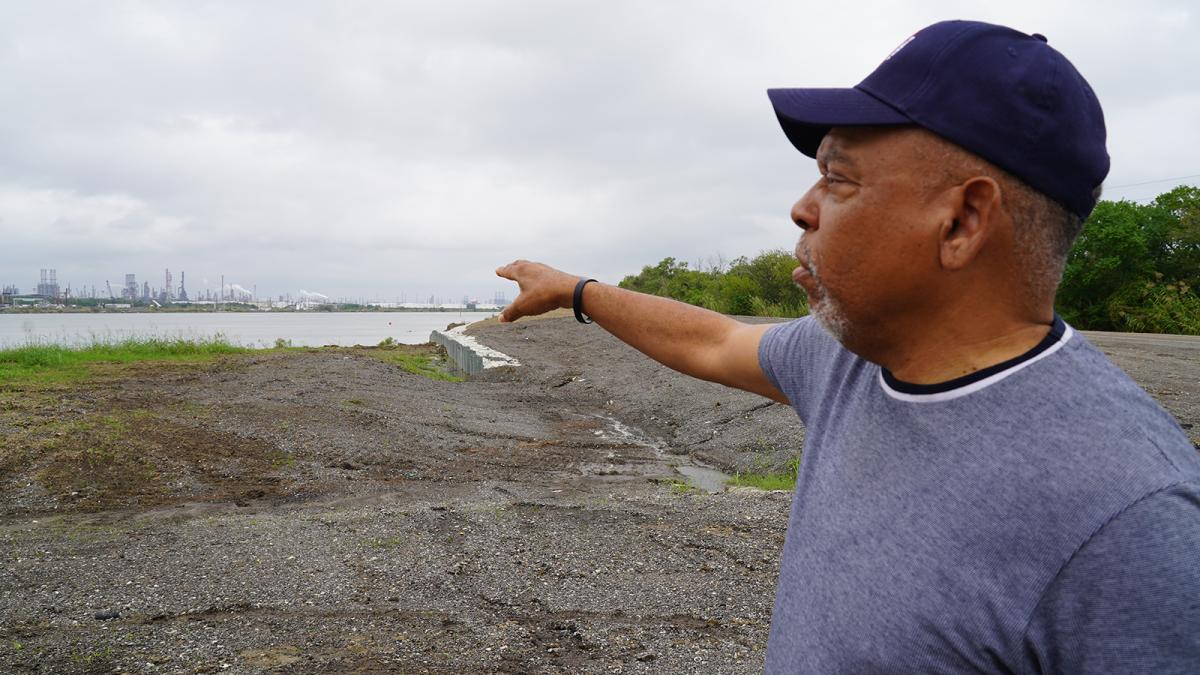
The first refineries in Port Arthur were built in 1903, he said, and the only time they ever stopped operating was during Hurricane Harvey in 2017. The two largest refineries in the country were located there, within 15 miles of each other. Beard worked as an operator at the one owned by Exxon Mobil for 38 years.
As we crested a bridge overlooking the patchwork of industrial complexes in western Port Arthur, he rolled down the windows.
“You’re smelling wood particles that are laced with formaldehyde,” he informed us, gesturing toward a wood pellet manufacturing facility just out of view.
For several hours, we drove between the different industrial operations in town, stopping to photograph hundred-foot flares and smokestacks emitting billowing steam. Across the river from Sempra Energy’s new liquified natural gas terminal, a group of fishermen were reeling in their daily catch while a pelican perched on a railing nearby, eying them cautiously. According to data from the Texas Cancer Registry, cancer rates among Black residents in Jefferson County, which encompasses Port Arthur and the industrial city of Beaumont to the north, are around 15 percent higher than the state average.
The cruel irony of all the Gulf Coast’s industrial corridors — that mere miles away from neighborhoods where people are too financially stressed to repair their hurricane-damaged homes, the world’s highest revenue-generating companies operate — seemed particularly pronounced in Port Arthur. Workers come from “lily white” suburbs, Beard explained, while locals struggle to make ends meet. The city’s poverty rate hovers around 30 percent, nearly triple the national average.
It’s the same formula I had seen again and again, in the towns Regan visited and in the dozens of others he hadn’t. It’s a problem bigger than the Southern U.S., one that spans Midwestern cities like Gary, Indiana, and southwestern villages like Murray Acres, New Mexico; places where people’s health and futures had been sacrificed for industries that promised to make the country more prosperous and comfortable to all.
It’s also a problem bigger than the EPA. With approvals from elected officials, industrial companies will always set up shop where it’s most profitable for them to: alongside deepwater ports, near natural resource deposits, and in areas where infrastructure like pipelines and roads already exist. The EPA’s job, then, is to somehow regulate the ever-expanding anatomy of industrial America. Its mandate does not require it to consider the necessity or risks of an operation before it comes into being; only to ensure that operation remains in compliance with federal standards. Regan’s EPA tightened many of these rules, requiring for the first time, for example, that synthetic chemical manufacturers monitor the air near their plants. But in a place like Port Arthur, where different kinds of pollution sources operate in the same industrial sprawl, clotting the air and coloring the water, no amount of overhauled regulations (which take years to come into effect) can make it safe. Perhaps this is the most we can expect of the EPA, regardless of whom the president is: incremental progress in the form of pollution-source rule updates, too slow to match the churn of economic growth.
I reached out to Administrator Regan to get his thoughts on what I’d heard as I retraced the path he took four years prior. I also requested an interview with Earthea Nance, the administrator of EPA Region 6, which includes Texas and Louisiana. Neither would meet with me, their press secretaries informed me. They were busy wrapping up their terms and preparing for the holidays, the national office’s spokesperson said, but I could look out for a documentary about the tour soon to be published on the agency’s website. It would answer most of my questions, he assured me.
The video, however, told a familiar story in American politics. Regan decried the environmental pollution he witnessed as “unacceptable anywhere in the United States of America.” And then he championed government funding as the solution. “At EPA, we have designed billions of dollars in grant programs, billions of dollars being invested into our infrastructure to ensure that every single person — no matter the money in your pockets, the color of your skin, or the ZIP code you live in — will have access to clean water, clean air, and safe and healthy lands.” Ultimately, the video betrayed no concern about the threat to such funding under Donald Trump’s next term; nor did Regan himself speak directly to the root of the pollution — industrial activity. “The journey to justice continues,” Regan concluded.
Our final stop on Beard’s tour was a refinery owned by Motiva, a U.S. subsidiary of a Saudi company, separated from a single house by a levee, a weak creek, and a road — maybe 100 feet. Beard knew the woman who lived there, and wondered if she was home. All along the levee, signs warned passersby of the highly pressurized natural gas pipeline that ran under their feet. Long white cushions had been laid across the ditch; Beard asked us to guess what they were. Nobody offered any.
Oil absorbers, he said finally, laid down to absorb the crude oil that floated into the creek.
“What are we making this sacrifice for?” Beard asked. “It is certainly not doing us any good.”
This story was originally published by Grist with the headline Lead in the water and chloroprene in the air: Who does the EPA protect? on Jan 16, 2025.
This content originally appeared on Grist and was authored by Lylla Younes.
This post was originally published on Radio Free.





The Biden administration promised change for overpolluted communities in the South. Four years later, they’re still waiting.
By Lylla Younes Jan 16, 2025When President Joe Biden announced his Justice40 Initiative, a week after he took office in January 2021, it had been almost 30 years since a U.S. president had signed an executive order related to environmental justice. He directed the federal government to allocate 40 percent of the benefits of climate, clean energy, and other investments to disadvantaged communities “marginalized by underinvestment and overburdened by pollution.”
Biden’s initiative was a kind of rejoinder to President Bill Clinton’s earlier executive order, which directed federal agencies to identify and address the adverse human health and environmental effects of their actions on minority and low-income areas. While much toxic pollution was curbed in the decades in between, for the parts of the country with the highest concentrations of industrial activity, things hadn’t improved at all. More industrial companies set up shop. Dump sites swelled. Contaminated rivers became more contaminated. Lead accumulated in the soil. Biden’s Justice40 Initiative gave his new Environmental Protection Agency administrator, Michael Regan, the task of not looking away.
In November 2021, as if to signal that the EPA had turned a leaf, Regan embarked on a tour of Southern towns and cities where the problem of environmental injustice is most acute: Jackson, Mississippi; Cancer Alley and Mossville in Louisiana; Houston, Texas. Dubbed the “Journey to Justice,” he met with community leaders and residents whose testimonies he promised he’d take into account when he returned to Washington.
“[The tour] was really eye-opening,” Regan said in an EPA documentary about the trip. “To see it, to feel it, to have conversations. … I saw on the ground people expressing a desire to be treated like everyone else.”
This fall, I set out to retrace Regan’s tour and look for signs of whether and how much the struggle for environmental justice truly advanced under Biden and Regan. Having reported on the region and the EPA’s operations there for six years, I knew that in its most polluted areas, changing conditions on the ground would take longer than a presidential term; still, I wondered whether the immediate actions that residents say they need — fines for companies violating federal standards, home buyouts with fair prices, permit reform, more government transparency — had been granted.

I knew that this iteration of the EPA was a test — of the limits of American bureaucracy, of the strength of industrial and corporate power, of the purpose and efficacy of the EPA itself.
No previous administration had dedicated enough resources, funds, or public relations efforts needed to confront industry’s unbridled expansion in the country’s most polluted and vulnerable areas. Cleaning up America’s air and water, a bipartisan mission at the EPA’s founding in 1970, has become highly politicized over the years, with reactionary state governments and industrial companies balking at the agency’s attempts to tighten regulations — all of which makes it difficult to imagine another administration, especially one led by Donald Trump, continuing these efforts.
Over 500 miles, through thick swampland and crowded interstate highways, I encountered scenes and people that elucidated the promise of Biden’s environmental justice agenda — and where it fell short. The administrator’s visits raised the profile of these industrial sacrifice zones and spurred EPA efforts to strengthen industrial regulations. But many community leaders remained frustrated at the agency’s hesitation to push for more aggressive, systemic change. Policies like permit reform and deepening community engagement could have helped safeguard the progress of the past four years against the whims of President-elect Donald Trump and his incoming administration, which has promised to clear the path for unchecked oil and gas production. Indeed, over the course of the Biden EPA, the agency’s core function was exposed. So were its limits.

Regan began his Journey to Justice tour in Jackson, Mississippi, on the same day in November 2021 that Biden signed the first of his two landmark climate bills, the bipartisan infrastructure act, into law. The capital city is at the end of a long period of decline. In most of its neighborhoods, tangles of overgrowth spill onto wide, empty streets bearing cracks and potholes. Torn up segments of asphalt and caution tape are ubiquitous. All across south and east Jackson, abandoned homes appear to be overtaken by the land, the roofs fallen in, the windows all gone, vines threading up the exteriors as if to pull the structures back down into the earth.
The city, which is more than 80 percent Black and has a poverty rate more than double the national average, is also in dire need of extensive infrastructure upgrades to its water system — an issue within the remit of the EPA. As Biden and Regan were just taking office, a quick succession of severe winter storms caused systemic failures at one of Jackson’s primary water treatment facilities. About 20,000 customers served by the O.B. Curtis plant — 15 percent of the city’s population — lost access to safe, reliable water.
The facility lacked proper weatherization equipment and suffered from a lack of corrosion controls, which allowed bacteria to spread throughout the system. By November, the city’s water distribution network was plagued by persistent leaks and lead contamination, and the whole system was nearing a breaking point. Rolling boil-water notices advised residents of E. coli contamination, which causes stomach pain and can lead to kidney damage. Additionally, two separate lawsuits filed by aggrieved parents blamed the city for their children’s lead poisoning diagnoses. One of Regan’s first stops in Jackson was to tour the Curtis plant with Jackson’s mayor, Chokwe Antar Lumumba, and Charles Williams, the city’s Public Works director. He pledged later that day to ensure the community, and others like it, would get the funds they needed to address infrastructure failures endangering public health.


A water tower, left, looms over an abandoned soy depot in Jackson, Mississippi. In another part of town, right, vines overtake old buildings. Lylla Younes / Grist
Later in the day, after his visit to Wilkins Elementary School, which was enduring low water pressure, Regan championed Biden’s infrastructure spending as a solution to environmental injustice. “We want those who need these resources the most to receive them first,” he said. “So we’re going to work very diligently with our state partners to ensure that, in months not years, communities like Jackson will be able to receive the funds and move forward with investing the funds.”
In January 2022, just a few months after Regan’s visit, the EPA issued a notice of violation to the city for failing to comply with the terms of the Safe Drinking Water Act, requiring local officials to develop a corrective action plan. In August, heavy rainfall caused the pumps at O.B. Curtis to fail again. Water pressure throughout the network plunged, and the entire city was without potable water. Mississippi Governor Tate Reeves declared a state of emergency. Pictures of Jacksonians waiting in long queues for National Guardsmen to load crates of water bottles into their cars flashed across national headlines.
Regan visited Jackson twice in quick succession. “It’s hard to explain how and why [the] government has failed the city of Jackson and the people of Jackson,” he said in an October interview. When asked whether he would consider implementing “a state or a federal takeover of the Jackson water system,” Regan replied, “We’re evaluating all options.”
By November, the EPA’s complaint against Jackson for violating the Safe Drinking Water Act ended up in federal district court, where Judge Henry Wingate issued an order appointing Ted Henifin, an engineer known for his experience overhauling municipal water infrastructure, to manage the system. Several weeks later, the Biden administration allocated an unprecedented $600 million to fix the city’s beleaguered water infrastructure. Something like a takeover was beginning to take form, and it was a moment of great hope for a city that had suffered decades of white flight and discriminatory neglect.
But in the years since, Jackson’s water troubles have become not only a crisis of public health, but also one of public trust. A wide cast of characters continues to vie for control of both the system and the narrative, and ordinary people are left wondering about the true state of affairs. In 2023, Henifin created a private company named JXN Water to carry out the overhaul of the city’s water system, and through which all of the federal money is funneled. It was a move that only worsened the issues of trust. The EPA, for its part, has been sidelined in a process it created.

I arrived in Jackson on a rainy night last October, about a week before the presidential election. Momentarily forgetting the purpose of my visit, I opened the kitchen tap at my rental to fill a glass of water and was immediately hit with the stench of rotten eggs. I stood by the sink with the tap running for a moment longer, shocked by how quickly I had encountered the very problem residents had described to me on the phone over the past year. Then I noticed the tall water dispenser in the corner.
“You’re on a war boat declaring the mission’s been accomplished, but bombs are still dropping,” local activist Makani Themba told me the next morning, referring to President George W. Bush’s infamous speech about the war in Iraq.
That, she continued, was what it has felt like to have the federal government swoop in to address the failing water system, only for the problems to persist.
We were chatting at Themba’s kitchen table. She has warm eyes and curly snow-white hair, which she’d gathered in a high bun. That day, she and other local advocates were still reeling from a recent hearing in which Judge Wingate accused them of being racist against Henifin, a white man, for challenging his governance of the water system. All they’d been agitating for, Themba said while stirring a pot on the stove, is transparency and community engagement. She and other activists had initially been excited about the engineer, having heard from environmentalists in St. Louis that he had worked miracles there. But instead of a collaborative process, many Jackson residents and activists were shut out once Henifin established his private company to fix the city’s drinking water problem.

“I wish that the EPA’s behavior here in Jackson would reflect the goals and the principles that the Biden administration laid out,” Themba said. “They talk about community involvement and all these things, but that’s not what we’ve experienced.”
“I’d say right now we’re in the worst position we’ve possibly been in since the EPA stepped in to help us,” said Tariq Abdul-Tawwab, the director of the Mississippi Rapid Response Coalition’s ground support team, which has been instrumental in mobilizing bottled water, filters, and lead testing kits to Jackson residents. Reflecting on the hearing with Judge Wingate, he continued, “When you’re being told you don’t have the right to ask questions, it’s the beginning of the end.”
Outside the realm of advocacy and politics, the water crisis has become a part of daily life. Willie Williams, the owner of the local restaurant Sweet Spot, pays a monthly bill to upkeep a water filtration system he installed, because he can’t serve or cook with the tap water.
“It’s more than a crisis. I mean, it’s something that you have to add to your budget when you’re a business owner,” he said. “Water is very important.”
Another Jackson resident, Lula Henry, who I’d been connected with by a member of the Mississippi Rapid Response Coalition, had recently come home to find her washroom and carport flooded after a group of city contractors blew open a hydrant while working on her street. When I pulled up to her house, furniture and cooking equipment lay scattered throughout the front yard, drying off in the sun. Like other residents I spoke to, Henry only uses the tap water in her house for cooking and bathing, and relies on bottled water for drinking and brushing her teeth. She called JXN Water to understand what happened. No one came to help.

The drive from Jackson to south Louisiana takes about three hours, and shortly past the state line, the strips of pine forest flanking the highway give way to extensive swampland. After crossing the freshwater marsh at Lake Maurepas, I was finally in “Cancer Alley,” a stretch of land on the lower Mississippi River between Baton Rouge and New Orleans where over 200 industrial facilities operate in the vicinity of historic Black neighborhoods. Recent studies have confirmed what residents of the region have long said, that people living along the fence lines of these industrial operations suffer from higher-than-average rates of miscarriages, infertility, respiratory ailments, and cancer.
Under the system of air pollution regulation in the U.S., fighting the construction of new industrial facilities is difficult. Cleaning up existing ones is even harder. Amendments to the Clean Air Act passed by Congress in 1990 divided the country’s industrial landscape into different categories of facilities and gave the EPA a decade to develop a set of regulations for each. It was a momentous task that required agency staffers to collect emissions data for thousands of plants across the country and determine what technologies industrial companies should install to reduce the pollution. These new rules, while useful for reducing — though not eliminating — emissions from facilities without pollution controls, could only work at the margins of the health crisis taking shape in the country’s most industrial areas. As toxicologists often point out, in the case of potent cancer-causing chemicals like dioxins, no level of exposure is considered safe.
“There’s nothing in the Clean Air Act itself that says a community has a right to be healthy and safe,” said Monique Harden, a former director at the Deep South Center for Environmental Law and Policy. “It’s a voluminous and very technical document that puts into law the status quo of industrial operations.”

Scott Throwe, who spent 30 years working in the EPA’s enforcement division, remembers the 1990s as a time of great activity and immense pressure. Agency staffers were directed to write rules that wouldn’t generate much public comment controversy or lead to lawsuits from chemical companies. In their rush to finalize all the rules by statutory deadlines, certain community health protections fell through the cracks.
“It’s like watching a sausage get made. It’s not pretty, and we made a lot of sacrifices,” he recalled. “We couldn’t get perfect rules out, and sometimes they weren’t even very good. They were just OK.”
The amendments to the Clean Air Act also directed the EPA to revisit the slate of rules after eight years to assess the cancer risk that remained in communities. Many of these “risk assessments” were conducted under George W. Bush’s EPA, which adopted a far less protective standard of acceptable risk than prior administrations. Whereas the original text of the Clean Air Act said the EPA should strive to protect the public from pollution exposure with a cancer risk greater than 1 in 1 million, the Bush EPA began using the exponentially less protective standard of 1 in 10,000.
While the Bush standard may seem fairly protective on its face, agency assessments only evaluate the cancer risk from a single chemical at a time. In reality, though, multiple plants operate simultaneously and in close proximity, releasing a slew of toxic chemicals on surrounding communities. The true cancer risk is cumulative.
The task, then, of enforcing these standards lies with state governments. Regulators in state agencies have wide latitude to permit new industrial facilities, along with construction and operating permits, wherever they see fit, including in areas that are already highly polluted.
When Regan came to Cancer Alley in November 2021, he visited Fifth Ward Elementary in St. John the Baptist Parish. The school sits in the shadow of the Japanese chemical company Denka’s synthetic rubber manufacturing plant. Regan told residents that the proximity of the facility’s toxic chloroprene emissions to the school reminded him of his young son, and that the trip compelled him to use his “bully pulpit” to make change.
Later, Regan left for a tour of nearby St. James Parish. Among the group of activists, local residents, and reporters there to receive Regan and his staff was Sharon Lavigne, a local organizer. When he emerged from his travel bus, the sight of a sharply dressed Black man around the age of her son shocked Lavigne.
“I thought it would have been an all-white man with gray hair,” she said. “He was good-looking!”

Regan expressed surprise at how close chemical storage tanks were to people’s homes. The administrator promised to buff up the EPA’s inspections of local facilities and require certain companies to install air monitors around their facilities.
In early 2022, Lavigne’s organization, Rise St. James, and several other local environmental groups filed two separate civil rights complaints with the EPA. One complaint alleged that the Louisiana Department of Environmental Quality, or LDEQ, had behaved discriminatorily by granting permits to companies to build in the parish’s Black neighborhoods, such as the Taiwanese chemical group Formosa’s proposal for a plastics complex in St. James Parish. The other contested the state’s decision to let Denka continue operating in St. John, despite the EPA’s own data showing that the cancer risk it generated violated federal standards. During previous presidential administrations, the EPA had allowed such complaints to languish unresolved, but under Regan’s leadership, the agency opened a civil rights probe into conditions in Cancer Alley.

Federal and state officials were making significant progress at the negotiating table in the early part of 2023. Louisiana officials agreed to assess pollution levels in communities before greenlighting new industrial development. But then Attorney General Jeff Landry (who’s now governor of the state) sued the EPA and the Department of Justice, arguing that they were overextending their authority. A month later, the EPA closed its investigation.
To Lavigne, the EPA’s handling of the civil rights complaints constituted a genuine attempt at improving conditions in Cancer Alley. Others I spoke to weren’t so generous. Lifelong St. James resident Melvin Whittington said the EPA’s actions in the region amounted to little more than “a front to make you think they’re doing something, but they’re not.”
With the civil rights probe closed, the EPA has run up against the extent of its power to do anything about the alleged discrimination in Formosa’s permitting. As for Denka, an EPA lawsuit against the company has been slowly making its way through the court system while the facility continues emitting the highly carcinogenic chemical chloroprene. In June, the NAACP’s Legal Defense Fund sued the St. John the Baptist school board for violating its Civil Rights-era desegregation order by exposing the majority-Black student body to Denka’s toxic pollution — a tactic that exposes why the dynamics inherent to the hopeful phrase “environmental justice” are sometimes referred to with the more unforgiving phrase “environmental racism.”


Melvin Whittington, left, said the EPA’s actions in Cancer Alley amounted to little more than “a front.” Whittington lives near the Denka synthetic rubber manufacturing plant, right. Lylla Younes / Grist
Considering these developments, Whittington wondered aloud whether the organizing they’d committed themselves to in Cancer Alley had even been effective. His words seemed to echo the sentiments of residents I’d spoken to in Jackson, who’d said that for all the resources and attention from the EPA, meaningful change was still elusive. “Doesn’t seem like we’re getting nothing done,” he said.
Five days after I left Cancer Alley, the St. John school board voted to shut down Fifth Ward Elementary.

On the morning of Election Day, I headed west toward Lake Charles, Louisiana, passing through sprawling fields of soybean and sugarcane under an overcast sky. The serpentine Calcasieu River forms the city’s northern border, and across it lie the industrial town of Westlake and the community of Mossville.
I’d been here before, back in 2021, when I sat on the plush couch of Debra Sullivan Ramirez’s dimly lit living room, just a month before Regan’s tour. Sullivan Ramirez grew up in Mossville and moved to the city of Lake Charles in the late 1980s to get her three children away from the pollution, which she attributed to the lesions that had formed on their skin. As I sat with Sullivan Ramirez and two of her friends, discussing the string of diseases that had stalked her family, she handed me a stack of documents she’d saved over the years — newspaper clippings detailing fires and explosions at local plants, permit files, emissions registers — evidence of a place under siege.
Over the past several decades, the greater Lake Charles-Mossville area has transformed into a transnational oil and gas hub, with new pipelines, liquified natural gas terminals, and industrial plants rising up out of the swamp and filling the air with the din of construction and the sweet odor of synthetic chemicals. In 2001, the South African chemical company Sasol, whose plant outside of Johannesburg is the biggest single emitter of carbon dioxide in the world, began building an ethane cracker in Mossville to produce ethylene. Sasol didn’t begin the industrial takeover of the town — that had started as far back as the 1940s — but it exacerbated the problems.
After deciding to expand its complex to include an ethylene cracker and a gas-to-liquid plant, Sasol began making offers to buy the properties of Mossville residents, but a study has shown that the company offered significantly less money to Black homeowners, many of whom trace their ancestry back to the founding of Mossville by formerly enslaved people. Some residents decided to take the buyouts anyway, and some decided to stay.
There are four things that the people of Mossville still want, Sullivan Ramirez told me: a lifetime of health insurance, free education, enough money to buy a proper home, and a memorial to honor everyone who’d died with cancer and liver failure.
Once called “the world’s most important chemical,” ethylene is used to manufacture everything from food packaging and airplane engines to polyester and drainage pipes. Toxic as it may be to create, it is an essential ingredient to modern life. But as Mossville learned, some people have to pay a higher price for it. A 2000 study from the Agency for Toxic Substances and Disease Registry found that the level of dioxins in Mossville residents’ blood was triple the national average.
When Regan’s tour bus pulled into Mossville that November, members of the Concerned Citizens of Mossville, a local advocacy group, showed him around. As they drove, one person asked Regan whether he was wearing a face mask to protect himself from COVID or from the air pollution. “Both, in this case,” he replied.

“It’s astonishing to see the level — the presence — of industry surrounding this community,” Regan told reporters later that day.
When I returned to Sullivan Ramirez’s house this fall, she was dismayed by the EPA’s actions since Regan’s visit. In January 2022, Regan announced funding for increased air and water monitoring in Mossville, but little else. Companies were rarely fined, or paid minimal amounts, for breaching federal emissions standards, and most importantly, people felt as though there was no way out. (Sasol, which earned $275 billion in 2024, reached a $1.4 million settlement with EPA last April for a string of violations, including a chemical fire at the facility). “EPA is just trying to pacify us. They’ve done nothing but ignore the community folk and what they want,” Sullivan Ramirez said. “We want true change.”
Today, the roads leading into Mossville are lined with abandoned homes with faded for-sale signs. As I approached, the air became acrid and I felt a familiar pressure in my nose, a sign of my proximity to petrochemical pollution. In the parking lot of the old community rec center, a man on a four-wheeler approached and asked what I was doing there. When I said I was a reporter, he waved me off and began driving away.
“Are you from Mossville?” I quickly asked.
He said he didn’t want to talk, that people like me came through from time to time and took pictures of the plants looming over people’s homes — and then they left.
But, he said, he’d been living there all his life. His mother’s home was down the road. The rec center was still open, he said, and if I stayed long enough I might see some kids playing ball. Sure, many folks had left. But for some, he made clear, Mossville was still home.
Mossville seemed to represent more clearly than anywhere I’d visited the terminus of unchecked industrial growth, the final result of a regulatory system administered by industry-friendly state governments and overseen by a federal agency with little power to do anything to upset business as usual. A well meaning EPA, like Biden and Regan’s, could offer an ear to communities in the crossfire or require companies to use better technology and hang up air monitors. But in a place like Mossville, the root of the injustice — a massive chemical complex — is left unchecked.


A playground sits in the shadow of a petrochemical facility in Mossville, Louisiana. More clearly than anywhere I’d visited, Mossville seemed to represent the terminus of unchecked industrial growth. Lylla Younes / Grist
Heading west from Mossville, the problem of pollution hotspots remains starkly apparent on the Texas Gulf Coast, where 10-lane highways fill the air with smog and dozens of industrial companies operate close together and share pipelines, storage infrastructure, and export docks. Regan traveled these highways on his way to Houston’s Fifth Ward, the last stop on the Journey to Justice.
The neighborhood is framed by plants that make concrete along Interstate 45 to the west and metal recyclers dotting Interstate 69 to the east. A cancer cluster, defined as a greater-than-expected number of cancer cases in a particular area, was identified in the community, the result of soil poisoning from Union Pacific Railroad’s former operations. A 2020 Houston Health Department study of the Fifth Ward found that more than 40 percent of the households surveyed had at least one cancer case.
Regan visited two churches and an elementary school in the Fifth Ward. He sat in the front yard of local activist Sandra Edwards’ home, and listened as she detailed the experience of living on contaminated earth. She wanted more than just a reduction in pollution levels. Like Sullivan Ramirez in Lake Charles, Edwards demanded restitution for the harm already done to residents’ health.
“We shouldn’t have to go all the way to the medical center across town,” she told him. “We should bring a facility to this neighborhood for people.”

Regan promised Fifth Ward residents what he had other communities on the tour — air monitoring, stronger enforcement, and better oversight of the state regulator.
“EPA is exploring ways that we can legally read the Clean Air Act in a way that allows us to take into consideration some of these external factors,” he said. “Do we believe that there’s some vulnerabilities there if people want to challenge us in court? Possibly. But the only way to find out is to test it.”
Longtime Houston resident Leticia Gutierrez left her corporate job for a position at Air Alliance Houston, an environmental justice advocacy organization, after her son was diagnosed with childhood asthma. Administrator Regan’s visit was meaningful, she said, particularly for the residents he met with, who have long family histories of cancer.
At the start of Regan’s term, Air Alliance Houston had really believed that change would come, but, Gutierrez said, “Here we are, four years later, with not much to really speak of.” The industrial facilities surrounding Houston kept up their steady work: In 2023, the city’s smog levels violated health-based standards on 55 days, more than any other year since 2011.
“We have access to EPA now,” she continued, “but what has that actually translated to?”
One thing that the EPA did do, in November, was to release its Interim Framework for Advancing Consideration of Cumulative Impacts, which the agency opened for community feedback. Once the document is finalized, it will provide guidance for local governments to better understand and mitigate the effects of cumulative pollution. That framework, however, will amount to little more than words of advice to state agencies unless a successive EPA administrator moves it forward.

On the last day of my trip, I drove back east to a city that Regan skipped over — Port Arthur, Texas, which is 75 percent non-white and is one of the country’s most important fossil fuel export hubs, where thousands of cubic feet of fracked gas are loaded onto tankers and shipped to Europe each year.
I was on my way to meet with John Beard, an environmental advocate and former chemical industry worker who’s now known for giving his own kind of tours. We were joined by a group of European climate activists traveling between hotspots of greenhouse gas emissions in the U.S.
We piled into Beard’s car and drove through the old downtown toward the industrial infrastructure along the coast. Abandoned buildings lined the streets around the city hall. In the surrounding neighborhoods, many homes had boards or plastic sheets instead of windows — damage from past hurricane seasons. Beard began listing facts about the city’s petrochemical history.

The first refineries in Port Arthur were built in 1903, he said, and the only time they ever stopped operating was during Hurricane Harvey in 2017. The two largest refineries in the country were located there, within 15 miles of each other. Beard worked as an operator at the one owned by Exxon Mobil for 38 years.
As we crested a bridge overlooking the patchwork of industrial complexes in western Port Arthur, he rolled down the windows.
“You’re smelling wood particles that are laced with formaldehyde,” he informed us, gesturing toward a wood pellet manufacturing facility just out of view.
For several hours, we drove between the different industrial operations in town, stopping to photograph hundred-foot flares and smokestacks emitting billowing steam. Across the river from Sempra Energy’s new liquified natural gas terminal, a group of fishermen were reeling in their daily catch while a pelican perched on a railing nearby, eying them cautiously. According to data from the Texas Cancer Registry, cancer rates among Black residents in Jefferson County, which encompasses Port Arthur and the industrial city of Beaumont to the north, are around 15 percent higher than the state average.
The cruel irony of all the Gulf Coast’s industrial corridors — that mere miles away from neighborhoods where people are too financially stressed to repair their hurricane-damaged homes, the world’s highest revenue-generating companies operate — seemed particularly pronounced in Port Arthur. Workers come from “lily white” suburbs, Beard explained, while locals struggle to make ends meet. The city’s poverty rate hovers around 30 percent, nearly triple the national average.
It’s the same formula I had seen again and again, in the towns Regan visited and in the dozens of others he hadn’t. It’s a problem bigger than the Southern U.S., one that spans Midwestern cities like Gary, Indiana, and southwestern villages like Murray Acres, New Mexico; places where people’s health and futures had been sacrificed for industries that promised to make the country more prosperous and comfortable to all.
It’s also a problem bigger than the EPA. With approvals from elected officials, industrial companies will always set up shop where it’s most profitable for them to: alongside deepwater ports, near natural resource deposits, and in areas where infrastructure like pipelines and roads already exist. The EPA’s job, then, is to somehow regulate the ever-expanding anatomy of industrial America. Its mandate does not require it to consider the necessity or risks of an operation before it comes into being; only to ensure that operation remains in compliance with federal standards. Regan’s EPA tightened many of these rules, requiring for the first time, for example, that synthetic chemical manufacturers monitor the air near their plants. But in a place like Port Arthur, where different kinds of pollution sources operate in the same industrial sprawl, clotting the air and coloring the water, no amount of overhauled regulations (which take years to come into effect) can make it safe. Perhaps this is the most we can expect of the EPA, regardless of whom the president is: incremental progress in the form of pollution-source rule updates, too slow to match the churn of economic growth.
I reached out to Administrator Regan to get his thoughts on what I’d heard as I retraced the path he took four years prior. I also requested an interview with Earthea Nance, the administrator of EPA Region 6, which includes Texas and Louisiana. Neither would meet with me, their press secretaries informed me. They were busy wrapping up their terms and preparing for the holidays, the national office’s spokesperson said, but I could look out for a documentary about the tour soon to be published on the agency’s website. It would answer most of my questions, he assured me.
The video, however, told a familiar story in American politics. Regan decried the environmental pollution he witnessed as “unacceptable anywhere in the United States of America.” And then he championed government funding as the solution. “At EPA, we have designed billions of dollars in grant programs, billions of dollars being invested into our infrastructure to ensure that every single person — no matter the money in your pockets, the color of your skin, or the ZIP code you live in — will have access to clean water, clean air, and safe and healthy lands.” Ultimately, the video betrayed no concern about the threat to such funding under Donald Trump’s next term; nor did Regan himself speak directly to the root of the pollution — industrial activity. “The journey to justice continues,” Regan concluded.
Our final stop on Beard’s tour was a refinery owned by Motiva, a U.S. subsidiary of a Saudi company, separated from a single house by a levee, a weak creek, and a road — maybe 100 feet. Beard knew the woman who lived there, and wondered if she was home. All along the levee, signs warned passersby of the highly pressurized natural gas pipeline that ran under their feet. Long white cushions had been laid across the ditch; Beard asked us to guess what they were. Nobody offered any.
Oil absorbers, he said finally, laid down to absorb the crude oil that floated into the creek.
“What are we making this sacrifice for?” Beard asked. “It is certainly not doing us any good.”
This story was originally published by Grist with the headline Lead in the water and chloroprene in the air: Who does the EPA protect? on Jan 16, 2025.
This content originally appeared on Grist and was authored by Lylla Younes.
This post was originally published on Radio Free.
Beirut, January 15, 2025—The Committee to Protect Journalists welcomes Wednesday’s ceasefire deal between Israel and Hamas in Gaza and calls on authorities to grant unconditional access to journalists and independent human rights experts to investigate crimes committed against the media during the 15-month long war.
“Journalists have been paying the highest price – with their lives – to provide the world some insight into the horrors that have been taking place in Gaza during this prolonged war, which has decimated a generation of Palestinian reporters and newsrooms,” said CPJ CEO Jodie Ginsberg in New York. “We call on Egyptian, Palestinian, and Israeli authorities to immediately allow foreign journalists into Gaza, and on the international community to independently investigate the deliberate targeting of journalists that has been widely documented since October 2023.”
Since October 7, 2023, CPJ has documented at least 165 journalists and media workers killed, 49 journalists injured, two journalists missing, 75 journalists arrested, and multiple other violations of press freedom in Gaza and the neighboring region.
To date, CPJ has determined that at least 11 journalists and two media workers were directly targeted by Israeli forces, which CPJ classifies as murder. A deliberate attack on civilians constitutes a war crime under international law.
CPJ’s data shows that eight journalists were murdered in Gaza — Ayman Al Gedi, Fadi Hassouna, Faisal Abu Al Qumsan, Hamza Al Dahdouh, Ismail Al Ghoul, Mohammed Al-Ladaa, Mustafa Thuraya and Rami Al Refee — and threein Lebanon — Ghassan Najjar, Issam Abdallah, and Wissam Kassem. In addition, CPJ has classified two media workers as murdered: Mohammed Reda in Lebanon and Ibrahim Sheikh Ali in Gaza.
CPJ is investigating about 20 other cases where there is evidence of deliberate targeting of journalists, their homes, and media outlets in Gaza during the war.
When approached for comment by CPJ about the deliberate targeting of journalists, the Israel Defense Forces said that some were members of militant groups but provided either questionable or no evidence for those alleged links.
This content originally appeared on Committee to Protect Journalists and was authored by Committee to Protect Journalists.
This post was originally published on Radio Free.
This content originally appeared on Democracy Now! and was authored by Democracy Now!.
This post was originally published on Radio Free.

We speak with journalists Steven Thrasher and Afeef Nessouli about their new report for The Intercept, which examines how queer, HIV-positive Palestinians are struggling to survive in Gaza with limited access to medication due to Israel’s siege and ongoing attacks on the territory. The report centers on E.S., a young Palestinian man who is HIV-positive and who has been in “a race against time,” says Nessouli. “The genocide is making it impossible to get medication to people like E.S.,” adds Thrasher.
This content originally appeared on Democracy Now! and was authored by Democracy Now!.
This post was originally published on Radio Free.
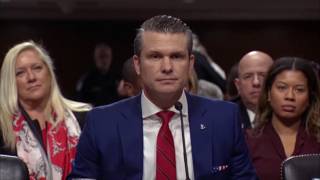
Pete Hegseth, Donald Trump’s pick to become defense secretary, appears to be moving toward confirmation after a contentious Senate hearing on Tuesday. He was grilled over his alleged history of sexual misconduct, reports of frequent public drunkenness at work, financial mismanagement at veterans’ organizations he led, and statements he has made disparaging women, LGBTQ people and others in the military. Hegseth’s confirmation can only be blocked if three or more Republicans join Democrats in opposing the former Fox News host, but so far the party appears aligned behind Trump’s nominee. Watch the highlights from Tuesday’s Senate confirmation hearing.
This content originally appeared on Democracy Now! and was authored by Democracy Now!.
This post was originally published on Radio Free.
In his last week in office, U.S. President Joe Biden has named two aircraft carriers being built after former presidents – the USS William J. Clinton and USS George W. Bush, the White House said in a statement.
Construction of the two carriers will begin “in the years ahead,” it said. “When complete, they will join the most capable, flexible, and professional Navy that has ever put to sea.”
The new carriers are part of a plan to boost American naval power.
The U.S. Navy has 11 aircraft carriers, all nuclear-powered, by far the largest fleet in the world. Rivals China and Russia have three and one, respectively.
With about 290 ships now, the U.S. Navy wants to expand the total fleet to 381 in coming years, according to the Council on Foreign Relations.
The Biden Administration has not explicitly endorsed that 381-ship objective.
“When I personally delivered the news to Bill and George, they were deeply humbled,” said Biden in the statement. “Each knows first-hand the weight of the responsibilities that come with being commander-in-chief.”
Named after presidents
Most U.S. aircraft carriers are named after former presidents. Bill Clinton was the 42nd U.S. president, serving two terms from 1993 to 2001.
During his time in office, Clinton ordered a naval deployment to respond to the Third Taiwan crisis in 1996, as well as air strikes against Iraq in 1998 to degrade its capabilities to manufacture weapons of mass destruction.
His successor, Bush, launched a global effort against terrorism following the Sept. 11, 2001, attacks on the United States and waged wars in Afghanistan and Iraq to defeat what Washington considered “two of the world’s most brutal and aggressive regimes.”
There is already a carrier named after Bush’s father, George W.H. Bush, who was president from 1989-1992.
US aircraft carriers
The U.S. Navy regularly deploys two or three carriers in the Indo-Pacific amid rising regional tensions.
“Aircraft carriers are the centerpiece of America’s naval forces,” said Defense Secretary Lloyd Austin in response to the naming of the two carriers.
“They ensure that the United States can project power and deliver combat capability anytime, anywhere in defense of our democracy.”
A Congressional Research Service’s report on the Ford-class aircraft carrier program said that the scheduled deliveries of several shipbuilding programs would be delayed approximately 18 to 26 months.
Edited by Mike Firn and Malcolm Foster.
This content originally appeared on Radio Free Asia and was authored by RFA Staff.
This post was originally published on Radio Free.
This content originally appeared on Democracy Now! and was authored by Democracy Now!.
This post was originally published on Radio Free.
This content originally appeared on Democracy Now! and was authored by Democracy Now!.
This post was originally published on Radio Free.
This week we swing into the new year, 2025, with Mickey engaging media scholar Nolan Higdon. They discuss the incoming administration, Trump 2.0, the failures of the punditocracy and what might mean for press freedom in his second term; social media and an end to so-called fact-checking; and why we will continue to need a truly independent press to keep us informed moving forward. Later in the program, media scholar Steve Macek joins the conversation, and it’s Deja Vu all over again as they revisit previously censored news stories around significant current events (including in Gaza) and how the ongoing lack of establishment media coverage around key issues contributes to low information voters and allows myriad injustices to persist at home and around the globe.
The post Pressing Issues for 2025: Trump 2.0, Media Failures, and the Fight for Press Freedom appeared first on Project Censored.
This content originally appeared on Project Censored and was authored by Kate Horgan.
This post was originally published on Radio Free.
In the age of information, misinformation is undoubtedly the biggest epidemic. Last year, the World Economic Forum said that India was at the “highest risk of misinformation and disinformation”. For Alt News, 2024 was anything but ordinary. From debunking claims that god was put behind bars to investigating rumours of multiple fractures and 150 grams of semen being found in the postmortem report of a junior doctor who was raped and killed at Kolkata’s R G Kar Medical College and Hospital, Alt News had its hands full.
The 2024 Lok Sabha elections, which spanned for over a month — between April 19 and June 1— were pivotal. As political parties kicked off their campaigns, we saw a spurt in not only misinformation but also hate speech. Through the year, Alt News documented several such instances. This includes speeches by Prime Minister Narendra Modi, whose pre-poll communal rhetoric blatantly disregarded the Election Commission guidelines.
The second round of the farmers’ protests, attacks on Rafah refugee camps in Palestine, student protests in Bangladesh, the R G Kar rape and murder and ongoing violence in Manipur were other major events that shaped 2024, unleashing, in its wake, a flood of misinformation and targeted hate against certain communities.
Through the past year, Alt News published 347 reports in all. Of this, in at least 299 stories we fact-checked viral claims, often false and peddling misinformation. This included misinformation that was viral on social media as well as misreporting by media outlets. In the remaining 48 stories, we documented instances of targeted hate speech and hate crimes (read this and this), platform accountability by big tech (examples 1, 2) and also did deep-dive investigations (for instance, this and this) and analysed coverage patterns by news publications (1, 2 and 3). More on this later.
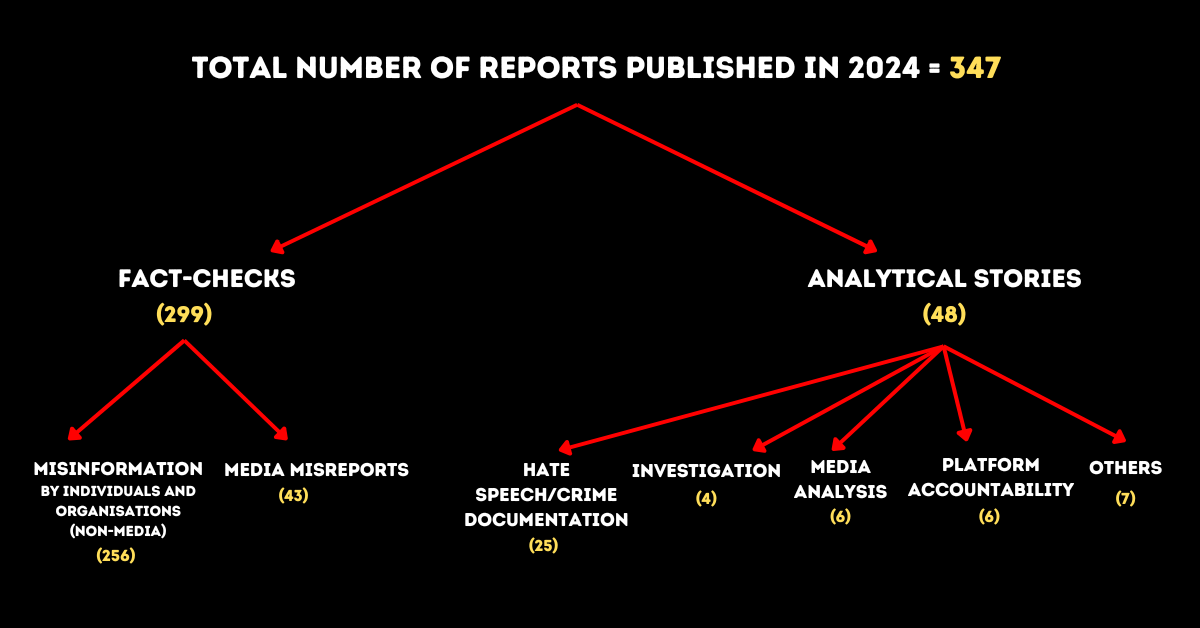
The ‘Others’ category in the above graphic refers to stories that do not exactly fall under the aforementioned categories. Take, for instance, our story on Dharmendra Pradhan going from ‘no corruption’ to assuming ‘moral responsibility’ all within a week amid allegations that the National Eligibility-cum-Entrance Test papers were leaked; or our story on the desperate search for a sabotage theory amid several train accidents.
Let’s take a closer look at some of the themes that dominated our coverage, sources from where most misinformation emerged and the medium most effectively used to disseminate this as well as who some of the biggest targets were.
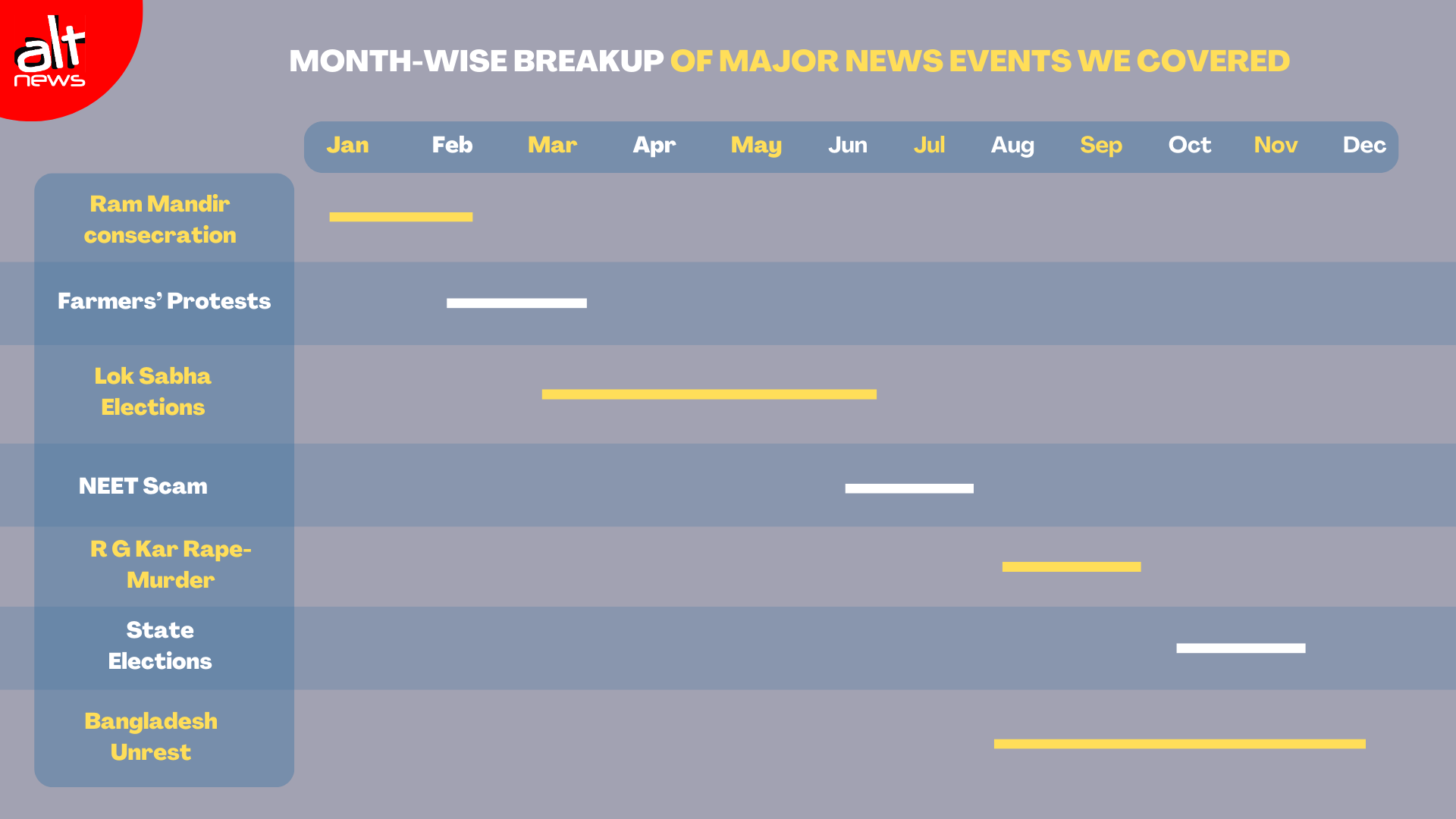
The Lok Sabha elections dominated the news cycle in the first half of the year. Between April and June, Alt News conducted 42 fact checks on election-related misinformation. Nearly 31% of such misinformation targeted the Congress while 24% targeted the ruling Bharatiya Janata Party. We documented multiple instances wherein the model code of conduct set by the Election Commission was blatantly violated. We also wrote about the polling body’s reluctance to act against violations by the BJP or its leaders.
Our reportage looked into several instances in which pre-poll campaign speeches delivered by the Prime Minister himself were the source of misinformation or targeted hate, violating the model code of conduct (Read here, here and here). Post results, our analysis showed that the BJP lost in at least 20 constituencies where PM Modi delivered hateful or communal speeches.
In February 2024, farmers held the second round of protests demanding that the government mandate a minimum selling price (MSP) for all crops and waive off their debt. Our first fact-check report related to the farmers’ protests was published on February 16, barely three days after their ‘Delhi Chalo’ march began. In February alone we debunked eleven claims that spread misinformation about the protests.
In May, Israel launched airstrikes in Rafah, Gaza, killing at least 20 civilians. Soon after this, several social media users who associate themselves with the Right resorted to sharing distasteful edits of a viral AI image that said “All Eyes on Rafah”. Our deep dive looked at how distorted versions of this image, originally made to show solidarity with affected Palestinians, were now trivialising Palestinian casualties. Indians, especially celebrities, who shared the viral image were trolled for talking about atrocities happening “thousands of miles away”.
Between July and September, we fact-checked claims related to the Manipur conflict. An important story by us on Manipur was a misreport by the news channel Republic. On September 3, Republic aired a video purportedly showing a boy firing a man-portable air defence system and labelling it as ‘exclusive’ footage of Manipur insurgents attacking a village. Our investigation found that the video was actually from Myanmar and had no connection to Manipur whatsoever. Another important story by Alt News on Manipur was a media analysis of Hindi news channels’ partisan reportage of Congress leader Rahul Gandhi’s visit to Manipur in July.
In August, a junior doctor at Kolkata’s R G Kar Medical College and Hospital was raped and brutally murdered in her sleep. The incident shook the country. It also resulted in a massive wave of misinformation and false narratives being widely shared as public knowledge. Most mainstream Indian media houses too fell short of delivering verified and credible information. Between August and September, Alt News verified at least 12 false claims related to the R G Kar rape and murder. A fourth of these were misreports by the media. (Read here, here and here)
Around the same time, student protests in Bangladesh also began taking a violent turn. The aftermath of the protests, which eventually resulted in Sheikh Hasina’s government being overthrown, also generated a massive spurt of misinformation that the country continues to reel under. Through the year, Alt News published at least 35 fact-check reports debunking misinformation from Bangladesh.
Other key events that shaped our coverage were the allegations of corruption and paper leaks surrounding the National Eligibility-cum-Entrance Test and the indictment of Indian billionaire Gautam Adani and senior Adani group executives by a United States court.
Broadly, our fact-check reports dealt with five major categories: communal misinformation, religious misinformation and claims related to national politics, international affairs and sectarian conflicts. Misinformation targeting specific communities, often with the intent of fostering harmful and offensive narratives, was categorised as communal misinformation In contrast, reports involving claims that mention a particular religion but did not necessarily target that community were classified as religious misinformation. Claims related to political parties, party leaders or their statements were classified as national politics, while those mentioning world affairs were categorised as international. Stories verifying claims targeting certain ethnic groups were classified under sectarian. Most of our Manipur coverage has been classified under this classification.

Stories that did not strictly fall under the above categories were classified as ‘others’.
As the data shows, 42% of Alt News’ fact-check reports published last year debunked claims related to national politics. Our coverage included fact-checking Union home minister Amit Shah’s claims about the West Bengal government not providing Durga Puja holidays, LoP Rahul Gandhi purportedly carrying the Chinese constitution in election campaign meetings and OpIndia editor Nupur J Sharma misquoting the Supreme Court.
This was followed by communal misinformation, which accounted for 39% (118 reports) of all fact-check reports we published. We looked into claims related to the Mira Road clashes in February 2024, how the rape of a Spanish vlogger in March was given a false communal spin and how surveillance footage by Ranchi police during Ram Navami was used by social media users to falsely target the Muslim community.
Fact checks dealing with international news made up 4% of misinformation we verified, religious misinformation was at 3% while misinformation targeting sects made up 1%. Other stories such as a protestor at the R G Kar protests being misidentified as a doctor, OpIndia inaccurately fact-checking Live Law or an AI image of Algerian boxer Imane Khelif going viral constituted 11% of the claims we debunked in 2024.
To authenticate the veracity of most viral claims, we often need to track down the source of misinformation and from where it all took off. Interestingly, many of these sources identified in our reports were repeat offenders. These sources include social media accounts of political parties, party leaders, news outlets, journalists and prominent social media users.
Prominent social media users—usually those with a fair number of followers—were further split into three groups based on the content they usually share. Social media users who frequently appeared in our fact-checks and publicly identified with Right-wing ideology or frequently endorsed content by the BJP were classified as pro-Right social media users. Users such as @MrSinha_, @SaffronSunanda and @arunpudur, whose social media posts we have often fact checked, fall under this category. The classification also includes propaganda outlets such as OpIndia, Sudarshan News and Panchjanya, which openly identify with or are affiliated with the Right. Meanwhile, anti-Right social media users include those who openly counter or oppose the BJP or Right-wing narrative, such as Prashant Bhushan (@pbhushan1). ‘Other social media users’ include individuals who share misinformation but do not have any clear political leanings.

In the graph, media misreports refer to instances where news outlets were the source of misinformation. When a falsehood was shared by independent journalists or posted by influential correspondents (not necessarily their publications) the source is classified as journalists. Other political parties and their leaders include Trinamool Congress, Telugu Desam Party, Shiv Sena (UBT) and Samajwadi Party.
As the data clearly shows, pro-Right social media users were the biggest proponents of misinformation in 2024. A third of all misinformation Alt News fact checked last year was propagated by this group. The second-biggest source of misinformation was other social media users propagating claims such as the Golden Temple being surrounded by churches, sharing footage of a Dhaka student league leader being ‘punished’ as an attack on Hindus or misattributing cattle slaughter in Bangladesh to West Bengal.
Meanwhile, 14% of the misinformation we fact checked was shared by official handles of the BJP and its party leaders combined; the Congress and its leaders accounted for 3% of the misinformation we verified.
Ironically, media—dubbed democracy’s fourth pillar—was the fourth-largest source of misinformation in Alt News’ reports last year, accounting for 14% of claims we fact checked.
We also found that in 113 of the 126 fact-check reports dealing with political misinformation nationally, the source was either political parties, politicians themselves, influential individuals or other social media users. The media was the source of political misinformation in 13 instances.
Pro-Right social media users had a major role to play in spreading communal misinformation. These users were the source of misinformation in 58% of the 118 communal claims we debunked last year. These users were a key source of misinformation at a time when there was a surge in cases of violence against Hindu minorities in Bangladesh. In several other stories, we point out how unrelated images, videos and claims were being shared by this group as cases of atrocities against Hindus in Bangladesh. In 2023 as well, when the Israel-Palestine conflict was at its peak, we had seen that a lot of anti-Palestine misinformation came from Indian social media users.

While misinformation campaigns targeted many including political parties, religious and ethnic communities and prominent individuals. Based on our reports, the Muslim community was the most frequently targeted; 32% of our fact-check reports featured misinformation singling out this community. (Read here, here and here)
The Congress and its leaders were the second-most targeted group (16%), followed by the BJP and its leaders (10%). Other religions in the graph include Buddhists, Christians, and Kukis while other political parties refer to AAP, AIMIM, CPI(M), Samajwadi Party, Shiv Sena (UBT), Telugu Desam Party and YSRCP.
Medium is a key factor in the spread of misinformation. We focused on five broad mediums through which much of the fake news we verified was spread. This included videos, claims, images, audio and news.
Claims here largely refer to text in social media posts (such as X or Facebook posts and viral WhatsApp messages) and statements made by influential individuals during campaigns or in media interactions.
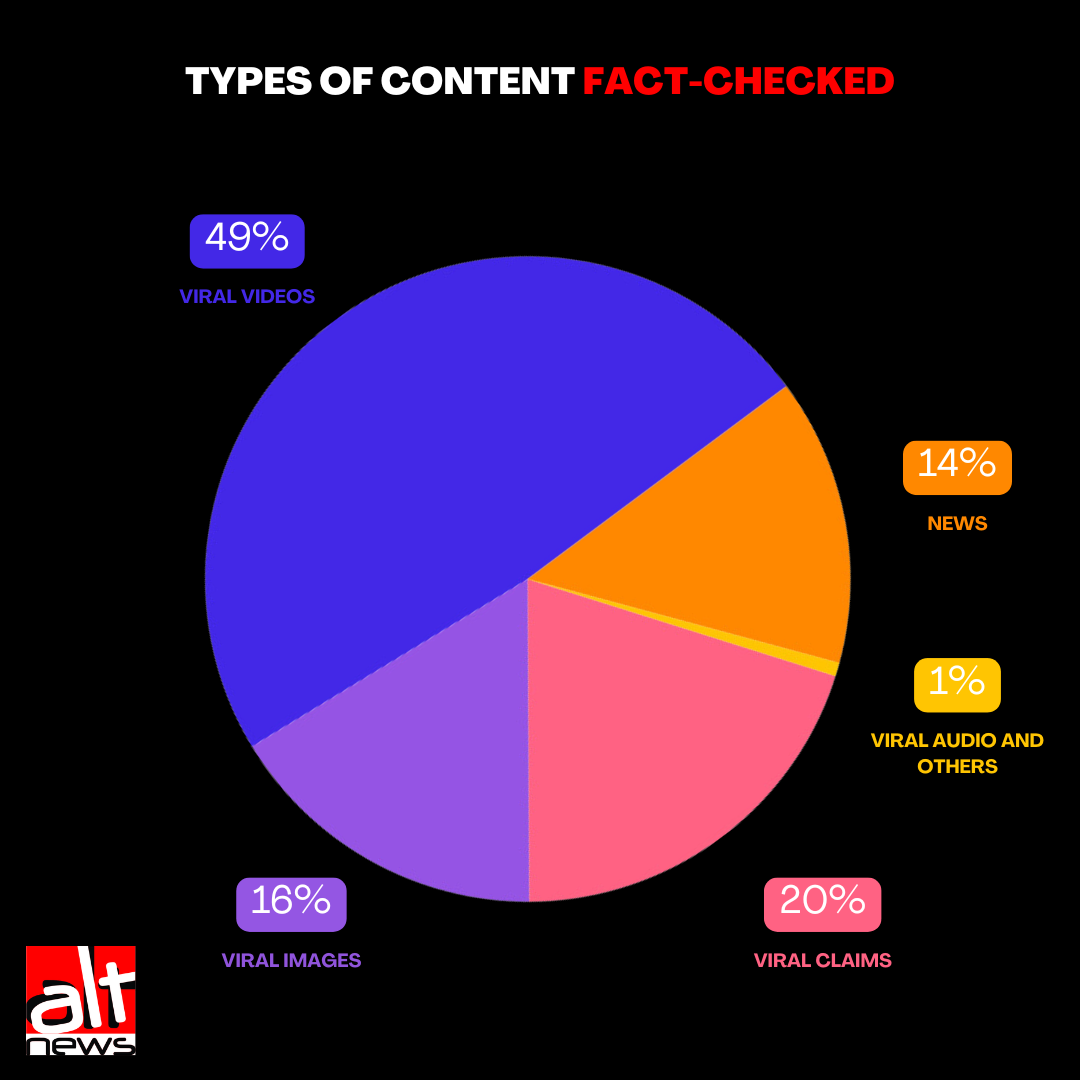
Videos accounted for approximately 49% of the content we verified this year. This was followed by viral claims, accounting for approximately 20% of the content we checked in 2024.
One category of viral videos we encountered, especially during election season, was clipped videos. These are usually montages created using bits and pieces of video footage, eliminating some key information and context in the process. Take, for instance, the time when BJP leaders shared a clipped video of Rahul Gandhi’s maiden speech as Leader of Opposition. They claimed that Gandhi called the entire Hindu community violent. However, as our story clarifies, his comments were an attack on far-right political organisations like the BJP and the RSS and not the Hindu community as a whole. Here is a link to the full story. Misinformation was also spread through morphed or scripted videos.
The claim by the BJP leaders and Right-wing ecosystem that Rahul Gandhi labelled the entire Hindu community as violent is FALSE. The video of his Lok Sabha speech viral in this connection is clipped. Find out more in this #AltNewsFactCheck | @AbhishekSayhttps://t.co/SyRpAbixkL
— Alt News (@AltNews) July 2, 2024
In 2024, viral claims, which often surface during a major or unusual occurrence or news event, were mostly communal in nature. For instance, a few days after news broke of the trainee doctor being raped and murdered at Kolkata’s R G Kar Medical College and Hospital, claims that three Muslim doctors were the primary accused began circulating. Through elaborate ground reports, Alt News verified that none of the three was close to the scene of the crime when the incident took place.
Around the same time, other claims such as the scene of the crime being vandalized and 150 grams of semen being found in the rape victim’s body also surfaced and went viral. Our investigation found the claims to be completely bogus. Interestingly, this claim was also amplified by media outlets including Barkha Dutt-led Mojo Story, Republic, The Times of India and Business Today among others.
This brings us to the next medium through which misinformation can be spread: News. Through the year, approximately 14% of what we fact-checked was owing to misreporting by media outlets.
It’s important to mention here that these categories are not watertight compartments and there are some overlaps. For instance, clipped videos often make their way into coverage by news publications. During the farmers’ protests in Punjab and Haryana in February, a clipped video of farmer leader Jagjit Singh Dallewal went viral. In this video, Dallewal purportedly urged listeners to brainstorm how PM Modi’s popularity, which soared after the Ram Mandir consecration, could be “brought down in a few days”. Our investigation revealed that the clip was edited and some parts from the original video were cut, distorting the context as a result. This edited video was circulated on social media and then aired by major news outlets including TV channels such as News18, India TV, Zee News, Times Now Navbharat, India Today and Republic among others. The video was also shared by news agency ANI.
WATCH how Zee, News18, Times Now Navbharat, India TV etc aired a doctored video which distorted a statement by farmer leader Jagjit Singh Dallewal. Several RW influencers amplified the edited clip while questioning the agenda behind the farmers’ stir: pic.twitter.com/6uRqeFNrxJ
— Alt News (@AltNews) February 24, 2024
Images were another common proponent through which misinformation was spread and accounted for 16% of the content we fact-checked. Misinformation through images can be spread by distorting photos using photo-editing tools or AI or by passing off old images as new or presenting them out of context to suggest something else.
For instance, in March, an image showing former Union minister Smriti Irani ‘belly dancing’ went viral. Our fact check revealed that the original picture was digitally altered and Irani’s face overlaid. Similarly, in another case, edits using an AI tool made it seem like Sonia Gandhi was holding a cigarette.
We also found several cases wherein official handles linked to political parties shared misinformation, especially around elections. In May, many state accounts of the BJP shared a poster claiming that under the party’s regime, 20 Indian cities had metro rail connectivity—a significant jump from 2014 when only five cities had them. The poster had a savvy metro train with elevated tracks in the background and PM Modi in the foreground. However, the image of the metro used in the poster is from Singapore and not India.
Besides these, we also fact checked WhatsApp chain texts, fabricated quotes and unveiled fake social media accounts.
Last year we published 41 long-form stories including documentation of communal speeches and hate crimes, investigative reports, media analyses and issues with platform accountability.
In February, our investigation unearthed a complex web of fake handles on X (formerly Twitter) running fraudulent fundraisers benefiting a ‘Sandeep Mandal’.
Alt News was instrumental in documenting hate speeches throughout the year, especially during the Lok Sabha elections which saw a major spike in communal speeches. Even PM Modi left no stone unturned in amplifying the party’s anti-Muslim rhetoric, dubbing Muslims as those who “have more children” and “ghusapethiyon” (infiltrators). We also looked at the Election Commission’s shortcomings in curbing the BJP’s communal speeches. Read our stories here, here and here.
With technology playing such a crucial role in the spread of misinformation, we did several stories on the cross-section of politics, society and technology platforms. In one such story, we looked at political ad spending on Meta, which operates Instagram and Facebook, around the elections and found that the BJP had invested the most in advertisements on the platform. Expenditure by BJP’s proxy pages — accounts that support the party by promoting its posts and ads but are not officially affiliated with it — was much higher.
In another report, we looked at how Meta failed to check the misuse of its ad system by allowing political ads glorifying someone getting shot and killed.
Before the year began, experts had warned that AI and deepfakes would fuel misinformation in an unprecedented manner in the 2024 Lok Sabha elections.
There were a handful of instances such as AI-voice cloning being used to manipulate a video of actor Aamir Khan to make it seem like he was endorsing the Congress. Similarly, AI was used to swap the voice of actor Ranveer Singh and make it sound like he was criticising PM Modi.
Apart from these, we did not find deepfakes having a major impact on the election or its outcomes but we did see AI-generated content catching up in a bigger way after the Lok Sabha elections. In November, we fact checked a viral video that used actor Amitabh Bachchan’s AI-cloned voice to make it seem like he was making scathing remarks on the state of affairs in the country. Days after the 2024 Paris Olympics and the controversy over Algerian boxer Imane Khelif being allowed to compete in the women’s category, a bare-chested image of hers was viral on social media. In this image, which we found to be AI-generated, Khelif was shown with very masculine features, reigniting the debate surrounding her gender identity. More recently, we verified another viral image, manipulated using AI, to make it seem like Rahul Gandhi was smashing 140 coconuts in a show of strength after the BJP tried to claim that he admitted to ‘dhakka-mukki’ in Parliament.
Authenticating some of these AI clips also made us realise that this area continues to pose a major challenge for fact checkers. For instance, just before assembly elections in Maharashtra, the BJP released audio clips alleging that opposition leaders were trying to illegally encash bitcoins. The audio clip was a purported call recording of Maha Vikas Aghadi leaders Supriya Sule and Nana Patole talking to an IPS officer and an audit firm employee. Sule claimed that the audio was AI-generated. This was backed by several fact-checking organisations. Alt News, however, could not publish any report on this because we were unable to independently verify whether the clip was factual or fake without using external AI tools that flag AI-generated content. Since these tools have been inaccurate in the past, there was no conclusive way to determine the authenticity of the audio.
We foresee the year 2025 to bring on more challenges, albeit of a different kind. With the United States undergoing a regime change, communal and media-based misinformation continuing unabated and Meta shutting down its fact-check initiative, the onus will be on us to put in more hard work and keep at what we do, perhaps in larger volumes.
The post 2024: The year when misinformation shaped elections, fuelled hate and aided conspiracy theories appeared first on Alt News.
This content originally appeared on Alt News and was authored by Oishani Bhattacharya.
This post was originally published on Radio Free.
Washington D.C., January 8, 2025—The Committee to Protect Journalists is alarmed by reports that Islamic Republic of Iran authorities arrested Iranian journalist Mohammad-Hossein (Mehrdad) Aladin in the capital, Tehran, and have since detained him in Evin prison, according to news reports.
“Iranian authorities must immediately and unconditionally release journalist Mehrdad Aladin and cease the practice of arbitrarily jailing members of the press,” said Yeganeh Rezaian, CPJ’s interim Middle East and North Africa program coordinator. “Journalists must be able to work without fear of retaliation.”
Aladin, a reporter, photojournalist, and a documentary filmmaker for the Didban Iran news website, was immediately arrested Janurary 7 after appearing at the preliminary court known as Shahi Moghadas, which is based inside Evin prison. Aladin was summoned earlier in the week to be interviewed before the court, according to reports.
Authorities have yet to publicly announce any charges against Aladin.
CPJ was also unable to confirm whether the journalist had been charged.
Aladin covers social and environmental issues. Aladin’s brother Koroush Aladin is a U.S. based journalist who reports for Voice of America Persian service.
CPJ emailed the Iranian mission to the United Nations in New York requesting comment on the arrest of Aladin but did not receive a response.
This content originally appeared on Committee to Protect Journalists and was authored by CPJ Staff.
This post was originally published on Radio Free.
Haitian journalist Jean Marc Jean was covering an anti-government protest in Port-au-Prince in February 2023 when he was struck in the face by a gas canister fired by police into the crowd. One of at least five journalists injured while covering civil unrest in the country that month, Jean arrived at the hospital with a deep wound next to his nose that damaged one of his eyes beyond repair.
A freelance journalist, Jean lacked financial support from the outlets he worked for to cover his steep medical bills. CPJ stepped in to cover the cost of the journalist’s hospital stay, surgery, a new glass eye and, eventually, glasses, so he could continue reporting.
Jean is one of more than 600 journalists who received a combined $1 million in financial grants in 2024 from CPJ’s Gene Roberts Emergency Fund. In addition to medical care, the funds can be used to cover costs associated with exile, legal fees, and basic living supplies in prison. Overall, CPJ drastically stepped up its assistance work last year, helping more than 3,000 journalists with financial grants, safety training, and other kinds of support amid rising threats to the media and declining press freedom.
Here are five other ways CPJ’s Emergencies department helped journalists in 2024:
——————
Supporting journalists in Gaza, the West Bank, and Lebanon to cover and survive war
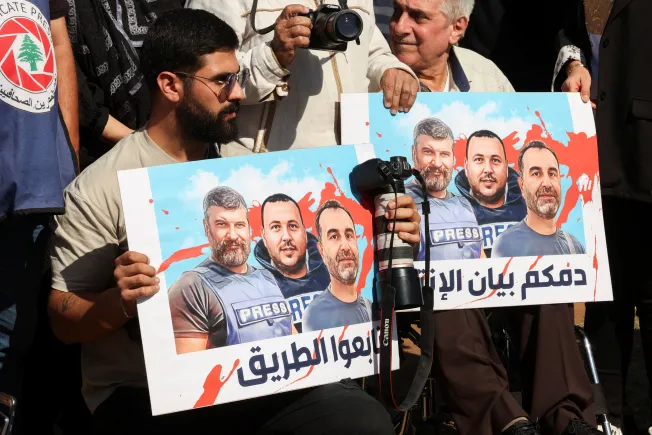
The Israel-Gaza war continues to be one of the deadliest conflicts for journalists since CPJ began keeping records in 1992. Israeli military operations have killed 152 journalists in Gaza and six in Lebanon; Hamas killed two Israeli journalists in its October 7, 2023 attack. As Israel conducts what rights groups call ethnic cleansing in northern Gaza, the country continues to forbid foreign journalists from accessing the territory without military accompaniment, leaving the coverage to the beleaguered local press.
In February, CPJ gave $300,000 to three organizations supporting Gaza’s journalists: the Palestinian Journalists Syndicate, Arab Reporters for Investigative Journalism, and Filastiniyat. Through these grants, journalists were able to access food, basic necessities like blankets and tents for shelter, and journalistic equipment including cameras, phones, and laptops so they can continue to be the world’s eyes and ears on Gaza.
“We keep hitting what feels like rock bottom, only to discover even deeper levels of suffering and loss,” Hoda Osman, executive editor of Arab Reporters for Investigative Journalism, told CPJ. “Yet Palestinian journalists persist. Their resilience cannot be overstated, and their work is essential—especially with foreign journalists barred from entering Gaza—but it is utterly unsustainable without continuous and significant support.”
As the war spread to Lebanon, CPJ provided grants to Lebanese freedom of expression groups the Maharat Foundation and the Samir Kassir Foundation to help journalists who were forced to flee their homes temporarily due to Israeli bombardment.
Providing resiliency and mental health workshops to journalists in Ukraine

Journalists living through and reporting on active conflict can face acute mental health challenges. Last year, CPJ partnered with Hannah Storm, a specialist in journalism safety and mental health and the National Union of Journalists of Ukraine to provide resiliency and mental health workshops for Ukrainian journalists experiencing anxiety and stress due to their coverage of the full-scale Russian invasion of Ukraine, now about to enter its fourth year.
In 2024, CPJ helped to host three online mental health workshops attended by 160 Ukrainian journalists, who learned how to prevent burnout when working in a war zone, how to remain calm while reporting during air raids and explosions, and how to work effectively under shelling.
“Despite the challenging and uncertain times they are living through, participants shared their insights and experiences, enabling a real sense of solidarity which I hope can be sustained,” Storm, the trainer, told CPJ.
Distributing VPNs to journalists covering civil unrest in Venezuela and Senegal

Journalists covering civil unrest around the globe in 2024 had to contend with threats to their physical safety and obstructions to their work, including internet shutdowns in countries with repressive regimes.
After Senegal postponed the February 2024 election, prompting mass protests in which more than two dozen journalists were attacked, Senegalese authorities censored news and information by shutting down mobile internet. In response, CPJ partnered with virtual private network (VPN) provider TunnelBear to distribute VPNs to 27 journalists reporting in and on Senegal, which helped them to continue working in the event of future online blocking.
Across the world in Venezuela, CPJ provided 25 journalists with VPNs to continue their coverage after authorities repeatedly imposed digital shutdowns as protests erupted over President Nicolás Maduro’s widely disputed claim to have won the country’s July 28 presidential election. Ongoing suppression by the Venezuelan government had far-reaching consequences throughout the rest of 2024; CPJ supported three Venezuelan journalists with exile support and trained 30 Venezuelan journalists on their digital, physical, and psychological safety in partnership with local network Reporte Ya.
“The use of a VPN is an essential tool for practicing journalism in Venezuela,” a Venezuelan journalist who received a VPN from CPJ said. “This is especially important in an environment where surveillance and censorship are constant concerns. By encrypting the connection, a VPN allows you to research and communicate with confidential sources with greater confidence.”
Helping U.S. journalists safely cover the 2024 election

Elections and times of political transition pose special risks to journalists. In a year that saw around half the world’s population go to the polls, the 2024 U.S. presidential election was no exception. Ahead of the election, CPJ trained more than 740 journalists reporting on the U.S. on physical and digital safety, and provided U.S.-based journalists with resiliency and know-your-rights advice through a summer webinar series with partner organizations.
Jon Laurence, Supervising Executive Producer at AJ+, told CPJ that the training was “invaluable.” “Many of our staff members who were deployed to cover the conventions were able to attend the training and felt much better resourced as a result.”
Reporters covered the November 5 election against a backdrop of retaliatory violence, legal threats, police attacks, and the specter of the January 6, 2021 U.S. Capitol insurrection. To make sure that journalists were as prepared as possible, CPJ reissued its legal rights guide for U.S.-based journalists, and distributed an updated election safety kit.
Providing grants to incarcerated journalists around the globe

Last year, CPJ provided a record 53 journalists with prison support in the form of a financial grant to help them access basic necessities behind bars, like food, water, and hygiene products. The grant can also be used by family members or lawyers to visit the journalist in prison, and to provide much-needed connection and emotional support. Recipients included journalists jailed in Myanmar, Iran, Azerbaijan, and Cameroon. For the first time, CPJ was also able to provide support to almost every imprisoned journalist in Belarus. Families of the 23 journalists helped by this grant were able to give care packages, consisting of items like stationery and medicine, to their loved ones. Some of the Belarusian journalists CPJ helped have since been released, and CPJ will keep fighting – and supporting – the hundreds who remain behind bars for their work.
For more information about CPJ’s journalist safety and emergency assistance work, visit CPJ’s Journalist Safety and Emergencies page. If you’re a journalist in need of assistance, please email emergencies@cpj.org.
This content originally appeared on Committee to Protect Journalists and was authored by Lucy Westcott.
This post was originally published on Radio Free.
This content originally appeared on Human Rights Watch and was authored by Human Rights Watch.
This post was originally published on Radio Free.
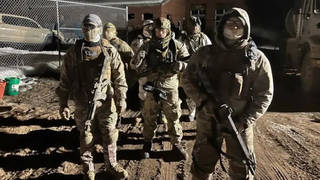
We speak with Pulitzer Prize-winning reporter Joshua Kaplan about his latest blockbuster article for ProPublica chronicling the rise of a “freelance vigilante” through the ranks of the right-wing militia movement in an effort to surveil and disrupt their operations. Kaplan’s source, a wilderness survival trainer named John Williams, says he went undercover after being shocked by the January 6 insurrection, when members of the Proud Boys, Oath Keepers and other armed right-wing groups led the riot at the U.S. Capitol. “He’s an extraordinarily talented liar,” Kaplan says of Williams. “These militia guys loved him.” Williams would eventually gain the trust of senior leaders in Utah and beyond, collecting information that revealed a sprawling extremist movement with connections to law enforcement, lawmakers and more. Kaplan says Williams’s infiltration revealed the militia movement is surging across the country, despite the failed 2021 insurrection. Now with Donald Trump promising to pardon many of the Capitol riot participants, this same movement appears set to expand even further over the next few years. “The ramifications could be massive,” says Kaplan. “They have the potential to trigger a renaissance for militant extremists.”
This content originally appeared on Democracy Now! and was authored by Democracy Now!.
This post was originally published on Radio Free.
This content originally appeared on Democracy Now! and was authored by Democracy Now!.
This post was originally published on Radio Free.